 14/12/2010 14:50 14/12/2010 14:50 |
|
| | | OFFLINE | | Post: 21.684
Post: 4.318 | Registrato il: 28/08/2005
Registrato il: 20/01/2009 | Administratore | Utente Master | |
|



 Tuesday, December 14, Third Week of Advent
Tuesday, December 14, Third Week of Advent
 ST. JUAN DE LA CRUZ (John of the Cross) (Spain, 1541-1591)
ST. JUAN DE LA CRUZ (John of the Cross) (Spain, 1541-1591)
Carmelite, Reformer, Mystic, Theologian, Poet, Doctor of the Church
There is probably no spiritual partnership as blessed and endowed with grace as that of the two great mystics and writers who flowered in the Spain of the Counter-Reformation - Teresa de Jesus and Juan de la Cruz, both sprung from the soil of Castile, the female and male faces of 16th century spirituality. Contemporaries and friends, they worked together to reform the Carmelite Order and experienced the fate of all reformers who are rejected by the establishment. Juan's life was a true identification with the Cross from which he took his name, producing his best poems and writings while languishing in prison, turning his 'dark night of the soul' into luminous prose and verse that continue to be models of mystical theology as well as undying literature.
Readings for today's Mass:
www.usccb.org/nab/121410.shtml
OR for 12/13-14:
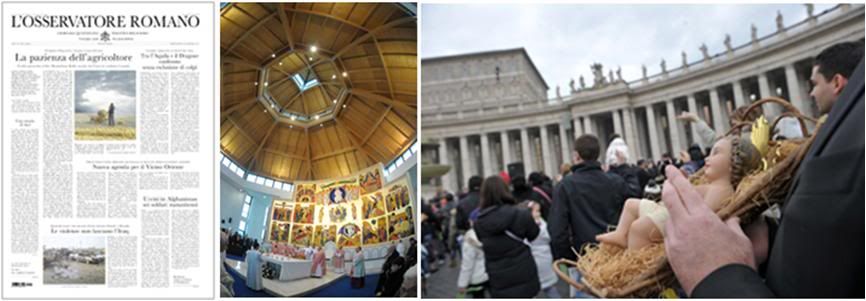
At the Sunday Angelus, the Pope tells faithful to rediscover the expectations of Advent
'The patience of the farmer is a model for waiting'
Visiting a Roman parish, he speaks on Christ as the true Light of the world
In a separate story on the Angelus, he asks children who came for the annual blessing of the Baby Jesus images for their home creches to say a prayer for him; and there's an editorial on his homily at the San Massimiliano Kolbe parish, as well as a story on the visit. Page 1 international news: China and the US hold an economic summit in Washington, while their political rivalry hinges on China's stronger financial position in the world; US tries again to re-launch direct peace talks between Israel and Palestine; terrorist bombs claim 14 dead and 40 wounded around Baghdad, and the Taliban kill 6 more US soldiers in Afghanistan. In the inside pages, a presentation by Cardinal Etchegaray on a new French book about Marian apparitions around the world; and an interview with an Italian astrophysicist on new knowledge about the origins of the universe from the scientific point of view.
No events announced for the Holy Father today, but the Vatican announced two papal initiatives during the Christmas season:
Sunday, December 26, 2010
13:00, Atrium of Aula Paolo VI
Luncheon offered by the Holy Father for the wards of the Missionaries of Charity sisters who help out in the various charitable works in the Diocese of Rome, and the nuns themselves to celebrate the centenary year of Mother Teresa's birth.
Wednesday, January 8, 2011
Vigil of the Epiphany
17:00 Visit to the child patients
at the Gemelli Polyclinic of Rome
The Holy Father will visit te hospital's pediatric wards, bless a new center for children afflicted with spina bifida, and take part in distributing gifts to the children.
I will continue to be away for most of the day because I have a laboratory inspection by the FDA today.
[Modificato da TERESA BENEDETTA 16/12/2010 09:47] |
| |
|
| |
 14/12/2010 14:55 14/12/2010 14:55 |
|
| | | OFFLINE | | Post: 21.685
Post: 4.319 | Registrato il: 28/08/2005
Registrato il: 20/01/2009 | Administratore | Utente Master | |
|

 Since last week, the English service of Vatican Radio has been lagging in reporting papal news, so this post is from the Italian service.
German bishops confirm
Since last week, the English service of Vatican Radio has been lagging in reporting papal news, so this post is from the Italian service.
German bishops confirm
Sept 22-25 dates for
the Pope's visit
Translated from the Italian service of

14 DEC 2010 (RV) - The German bishops' conference has confirmed that the Holy Father will be in Germany on Sept. 22-25, 2011, for his third visit to his native land since he became Pope.
The confirmation completes the calendar for Benedict XVI's apostolic visits in 2011. Alessandro Gisotti reports:
In 2011, Benedict XVI will make three apostolic visits abroad and four pastoral visits in Italy.
It will start with his visit to Aquileia and Venice on May 7-8, 2011 - 26 years since the last visit by a Pope (John Paul II) to the Queen City of the Adriatic.
Announcing the event last October, the Patriarch of Venice, Cardinal Angelo Scola, expressed joy and gratitude for this 'gift from the Holy Father' which coincides with the end of his own pastoral visits to the parishes of his diocese that he began in 2004.
On June 4-5, the Pope will visit Croatia, during which he will pay homage to Blessed Stepinac.
On June 19, he will make a pastoral visit to the Diocese of San Marino-Montefeltro, which straddles the independent Republic of San Marino and the Montefeltro diocese of central eastern Italy.
Announcing this visit, Bishop Luigi Negri said the Holy Father "will be visiting a Church which is making significant strides in recovering the traditions of a Christian people" in the midst of difficult times for society.
August will bring the much=anticipated World Youth Day in Madrid, which will be the third international WYD for Benedict XVI, after Cologne in 2005 and Sydney in 2008.
He will be making his third visit to Spain as Pope on Aug. 18-21 to take part in WTD Madrid, whose theme is "Rooted and founded in Christ, firm in the faith". He visited Valencia in July 2006 for the V World Encounter of Families, and was in Santiago de Compostela and Barcelona on Nov. 6-7 for a pilgrimage to the Tomb of St. James during the Jubilee Year of 2010, and to dedicate the Basilica of La Sagrada Familia, Antoni Gaudi's spectacular contribution to the city of Barcelona and chruch architecture.
There will be two trips in September: On Sept. 11, to Ancona, on the Adriatic coast of central Italy, to close the 25h National Eucharistic Congress; and on Sept 22-26, his visit to Germany, where he will be going to three cities - Berlin, Erfurt and Freiburg.
His last pastoral visit in Italy for 2011 will be to Lamezia Terme and the Carthusian monastery of San Bruno in southwestern Italy, on Oct. 9. The Bishop of Lamezia, Mons. Cantafora, said that the faithful of Calabria, one of the poorest regions in Italy, look forward to the Holy Father's visit to strengthen them in a time of great difficulty.
Lastly, the Pope will make his second visit to Africa to Benin (formerly the French colony of Dahomey) in central western Africa, on Nov. 18-20, to mark the 150th anniversary of the country's evangelization.
He will avail of the occasion to deliver to the African bishops his Post-Synodal Exhortation on the Special Assembly for Africa held at the Vatican in October 2009.
|
| |
 15/12/2010 00:32 15/12/2010 00:32 |
|
| | | OFFLINE | | Post: 21.687
Post: 4.322 | Registrato il: 28/08/2005
Registrato il: 20/01/2009 | Administratore | Utente Master | |
|
 Back to the forum now. The federal inspection turned out to be much less gruelling than the biennial state inspections, except the feds visit your lab at random, in our case with less than 24 hours notice... The checklists on every activity in the laboratory are so exhaustive and detailed it's easy to miss documenting or mis-documenting something... So that was my emergency, and thank God it's done!
There's little to catch up on in the Anglophone media, but a lot from the Italians, starting with this comment by Vittorio Messori on a US diplomat's assessment of Benedict XVI:
The Pope and Wikileaks
Translated from
Back to the forum now. The federal inspection turned out to be much less gruelling than the biennial state inspections, except the feds visit your lab at random, in our case with less than 24 hours notice... The checklists on every activity in the laboratory are so exhaustive and detailed it's easy to miss documenting or mis-documenting something... So that was my emergency, and thank God it's done!
There's little to catch up on in the Anglophone media, but a lot from the Italians, starting with this comment by Vittorio Messori on a US diplomat's assessment of Benedict XVI:
The Pope and Wikileaks
Translated from

Dec. 13, 2010
In these days, our newspapers and TV newscasts are flooded with thousands of documents from Wikileaks whose latest online dump concerns correspondence between the US State Department and its embassies around the world. And the powerful United States administration has been exposed to be full of holes.
Reading these dispatches, though in rather cursory fashion, has convinced me that diplomatic reports are a hodgepodge of empty chatter, things picked up from talking to newsmen, and idle commentary without particular relevance, much of it gossip.
But I do not wish the readers of BQ to miss a 'pearl' from one of the cables sent by the US embassy to the Holy See which reads: "The Pope sometimes irritates politicians and journalists when he does what he believes best for the Church, such as the rapprochement with the Lefebvrians or considering the canonization of Pope Pius XII".
I cannot imagine a better compliment or encouragement for the Bishop of Rome, than that he is thought to do what he believes to be his duty for the good of the Church, not really caring if he 'irritates' politicians and newsmen - in other words, he does not choose to follow what is politically correct, a criterion which has characterized and united the worlds of politics and media.
(Messori's note: The text cited was picked up from news reports and not from a document that had been personally reviewed by the writer.) [What an admirable old-fashioned and now-rare disclaimer from a journalist!]
A lengthy article in BQ goes beyond all the gossip and uninformed commentary in the Wikileaks documents to summarize the positive - and generally correct - conclusions drawn by diplomats at the US embassy about Vatican positions on international affairs and the value of bishops and missionaries in reporting information from countries like China, India and Cuba. The writer is an associate professor of international relations in Rome's Marconi University.
Ignore the gossip: Vatican diplomacy
comes out well in the Wikileaks documents
by Matteo Luigi Napolitano
Translated from

Dec. 14, 2010
In the Wikileaks disclosures about the Vatican, the elements that have ended up in the media have obscured the substance of documents which give a quite different view of Vatican diplomacy.
We can only give a rapid summary of elements which have escaped media attention but which are found in the Wikileaks documents.
On July 8, 2001, the Department of State sent all US embassies a summary overview of Vatican policies. Among the many elements it highlights are some which are truly interesting [even if previously known]: the fact that the Vatican "supports development in the Third World and favors debt exemption for the poorest countries; that it opposes embargoes for humanitarian reasons; and that it favors dialog among the various religions. And in the Middle East, that the Church is definitely committed to the protection of the Holy Places, including Jerusalem.
What the document says regarding China is striking: "The Holy See has excellent sources of information on dissidents, on human rights issues, on religious freedom and on government control of the population".
If one considers the difficult relations of the US with Beijing at the time, this is not an element to be ignored. But it is the supra-national view of the Vatican that seems to fascinate the State Department: "The bishops, not to mention missionary groups independent of each other, that give the Vatican a unique perspective on events in China".
In India, considering recent anti-Christian developments there, "The Vatican, the local bishops and various missionary organizations are adn continue to be observers vigilant about human rights abuses and related developments".
Even in North Korea, Catholic aid organizations who periodically visit the country are valuable news sources, and in the Great Lakes region of Africa (between the two Congos), the Vatican supports the work of the Sant'Egidio Community, which plays "an important role in the international efforts to mediate the crisis and keeps the Vatican informed of these efforts".
In Cuba, after John Paul II's visit, the Vatican has been looking forward to when Fidel Castro will leave the scene, even if it feared that "replacing him could be worse". But in an April 2009 dispatch, the State Department notes that in the Vaticna view, better relations between Cuba and the United States could help isolate the dangerous revolutionary Hugo Chavez of Venezuela and his acolytes in Latin America.
Another Obama-era document dated June 26, 2009, notes that "the Church in Cuba is the only major institution that is independent of the government" and that the Vatican "hopes for a transition to democracy in Cuba".
Among the Church's humanitarian activities, Washington is well aware that the Vatican has been campaigning hard against human trafficking, that it opposes the death penalty and that it is not aligned with the US position in Iraq.
A Washington dispatch dated August 19, 2004, noted it was evident that the Vatican favored the entry of Turkey into the European Union provided it observes certain conditions [such as proving its respect for religious freedom]. It also notes that Cardinal Ratzinger had expressed his opposition to the cultural implications of Turkey entering the EU.
But a dispatch from the US embassy to the Vatican on December 7, 2006, says that as Pope, Benedict XVI has become no less supportive of Turkey's entry than was John Paul II.
Equally positive is the US perception of the Vatican role in the United Nations. In the August 2004 report, the State Department noted that the Vatican had been active in opposing sexual tourism especially when it involves minors; promoting more development aid to poor nations and initiatives to reform the international system of providing humanitarian aid; strengthening condemnation of anti-Semitism by the democratic nations and that the UN should issue a declaration on anti-Semitism as strong as that which has been issued by the European Organization for Security and Development. [ Does the evaluation completely ignore the equally strong Vatican positions against a UN bureaucracy and a preponderance of national votes that contradict Catholic teachings on life and family issues?]
On the Vatican's relations with Zapatero Spain, on July 19, 2006, after the Pope visited Spain for the V World Encounter of Families, the US embassy at the Vatican noted that Benedict XVI "had chosen a respectful dialog with respect to the Spanish government's policies on gay marriage, divorce and abortion". {The statement was specific that in his brief meeting with Prime Minister Zapatero in Valencia, the Pope did not confront him on these policies, and also that the Vatican understood why Zapatero chose not to attend the papal Mass.] The note adds that the Pope's message at the Valencia event reaffirming the Vatican positions on life and family issues was addressed to the world and not to Spain in particular.
Other problems, in the eyes of Washington (external observers, after all), are unresolved. Such as relations between the Catholic Church and the Jews, exemplified by the latter's opposition to the beatification of Pope Pius XII.
Before the Pope's visit to the Holy Land, an embassy note in January 2009 noted that Benedict XVI is completely committed to good
Catholic-Jewish relations since these "would contribute to fighting anti-Semitism".
In view of all this, it is not surprising that the Vatican enjoys diplomatic prestige in the eyes of Washington. Before President Obama visited the Pope in the Vatican in July 2009, an embassy note on June 26, 2009, noted that "the Vatican is second only to he United States in the number of countries with which it has diplomatic relations (177 and 188, respectively)"; that L'Osservatore Romano is a friendly newspaper; and that the Vatican was particularly pleased at Obama's positions on human rights and closing down the terrorist prison in Guantanamo.
The note also informs Obama that the Pope actively promotes religious freedom on the international level and appreciates US support in this respect. Moreover, that Benedict XVI "enjoys respect even among non-Catholics and is therefore a moral megaphone that has no equal".
The note continues that the Vatican has been very explicit in favor of "protecting the most vulnerable people in the world from the damage caused by the international financial crisis" and is supportive of eliminating all nuclear arms.
On religious matters, the note says the Holy See has worked for decades to promote understanding with the Muslim world, undertaking interfaith dialog after 9/11, and especially after the Pope's Regensburg lecture.
On climate change, the US embassy notes in a January 21, 2010, dispatch that the Vatican wishes the failed Copenhagen initiatives to progress and is committed to environmental protection.
In short, the Wikileaked documents contain no surprises in general but many surprises in some details, but media reporting on it has focused only on so-called headline material without reflecting on the major points indicated by the documents.
In my humble opinion, even a superficial reading shows that the documents confirm that to the US, Vatican diplomacy enjoys a truly remarkable moral and political prestige.
But one other thing that has characterized most reporting of the Wikileaked documents is a lack of perspective. The Catholic Church is prismatic by nature - it weighs world events, reflects and talks about them with reference to two millennia of history, to the many civilizations and languages that comprise it, as many of the US documents acknowledge.
It is thus misleading to focus so much attention on idle commentary by US diplomats in these documents. What we have read so far, as Fr. Federico Lombardi pointed out, reflects the perceptions of those who wrote these documents. They are not necessarily unfounded. But scholars must realize that these are incomplete accounts that have to be judged against the complete record, as most historians or journalists ought to know.
Though I have not bothered to read each and every story about the Vatican-related Wilkileaked documents, I did comment at the start that the much-headlined Vatican 'refusal to cooperate' with the Irish government's Murphy Commission investigation - which many media outlets chose to focus on - was much ado about nothing since most of the offenses investigated took place before 2000, i.e., before the CDF was given jurisdiction over sex crimes committed by priests; and obviously, the best information about any case would come from the parish and diocese where it occurred. It turns out the Irish government thought so, too, in the leaked reports...
Wikileaks documents reveal that
Irish government decided Vatican involvement
was unnecessary in child abuse inquiry
By Deacon Nick

December 11th, 2010
One important and revealing fact contained in the leaked US diplomatic cable that has not been reported by The Guardian is the Irish Government’s conclusion that the Vatican’s involvement in the Murphy commission inquiry into child sex abuse was not necessary.
‘In the end, the Irish government decided not to press the Vatican to reply, according to Fahey’s [Irish Ambassador to Vatican] Deputy, Helena Keleher. Moreover, Keleher told Polchief the CDF [Congregation for the Doctrine of the Faith] probably did not have much to add to the inquiry.’
Protect the Pope comment: This important admission in a US diplomatic cable challenges the poisonous myth made up by Peter Tatchell in the dying days of the Protest the Pope anti-Catholic campaign, and unquestioningly disseminated by the media, that the Vatican must open up its thousands of secret files on paedophile priests.
Here we have in the US cable the truth of the matter, which is that local bishops and dioceses have primary responsibility for handling allegations of child sexual abuse by clergy and not the Vatican. The CDF’s recently acquired role is to make sure that the allegations are handled promptly and correctly by the local bishop.
The CNS story on Dec. 13 by John Thavis on the Wikileaked documents on Dec. 13 led off with what the cables said about the sex abuse scandal in Ireland but did not elaborate on it until after several paragraphs detailing the usual selection of the 'headline grabbers', but I shall only post what it says on this particular topic.
Wikileaks cables show Vatican
horrified by Irish clergy's sex abuses

VATICAN CITY, Dec. 13 (AP) - A spate of U.S. diplomatic cables released by WikiLeaks portray the Vatican as horrified over clerical sex abuse in Ireland but also deeply concerned that the procedures used by Irish investigators of the scandal were "an affront to Vatican sovereignty"...
The sex abuse scandal in Ireland was treated in a memo dated Feb. 26, 2010, written by Julieta Valls Noyes, the deputy chief of mission at the embassy. She wrote that the Vatican had responded relatively quickly to the revelations of sexual abuse in the Archdiocese of Dublin, in part because it had "learned key lessons" from the U.S. sex abuse scandal in 2002.
"Vatican and Irish officials' first concern was for the victims," the cable said. But that concern was sometimes overshadowed by the public perception in Ireland that the Vatican was worried about "pettily procedural" matters, it said.
Specifically, the Vatican was upset that the independent Murphy Commission that investigated the scandal had sidestepped diplomatic channels and tried to directly convene the Vatican nuncio, or ambassador, to answer questions and obtain other information from the Congregation for the Doctrine of the Faith.
The Vatican complained to the Irish Embassy, saying such requests must go through diplomatic channels, and in the end the government decided not to press the Vatican to reply, the cable said. It added that contacts at the Vatican and in Ireland expected the sex abuse crisis to continue for several years, as new allegations from other Irish archdioceses come to light...
[Modificato da TERESA BENEDETTA 16/12/2010 08:32] |
| |
 15/12/2010 01:56 15/12/2010 01:56 |
|
| | | OFFLINE | | Post: 21.688
Post: 4.323 | Registrato il: 28/08/2005
Registrato il: 20/01/2009 | Administratore | Utente Master | |
|

 It's odd that there was no mention of any event in the Pope's schedule on Tuesday, when the Wednesday issue of OR leads off with the Holy Father's Mass and homily Tuesday morning for the resident cloistered nuns at the Vatican....
At the Mater Ecclesiae convent,
It's odd that there was no mention of any event in the Pope's schedule on Tuesday, when the Wednesday issue of OR leads off with the Holy Father's Mass and homily Tuesday morning for the resident cloistered nuns at the Vatican....
At the Mater Ecclesiae convent,
the Pope's homily on
'Jesus as God's final Word'
Translated from the 12/15/10 issue of

Jesus is God's final Word to men, who shwed the true face of God to men by giving himself for their salvation. This was the theme for the Holy Father's reflection in his homily Tuesday morning to the seven nuns of the Mater Ecclesiae convent in the Vatican, on the feast of St. John of the Cross, which is also the end of the fourth centenary celebration of the Visitation order.
The Visitation sisters are the current resident contemplative nuns at the Vatican, where a different order serves every five years. They are the second rotation since Benedict XVI became Pope, having been preceded by Benedictine sisters.
[The Mater Ecclesiae convent within the Vatican was started in 1994 by John Paul II, who idea was that a small, international community of contemplative religious women would pray for the Pope, the Roman Curia and the universal Church from the geographical heart of Catholicism.]
In his homily, the Pope commented on some themes in the thought of St. John, the great 16th century Spanish mystic, who has been called the saint of the Paschal mystery.
In fact, the center of the mYstic's life was teh Cross, which he loved intimately. Loving the Cross, said the Pope, the saint understood that it is love, and that the mystery of love is fulfilled in the mystery of the Cross. Benedict XVI said that even as St. John emphasized the Paschal mystery and the identity between the Cross and love, the entire Christian mystery is unique.
He pointed out that God manifested himself in so many forms in the Old Testament to come near his people, through visions and prophetic words. Doubtless, he said, all this was a great expression of the richness of Revelation, in which an aspect of the divine mystery appears.
But there were not so many ways in which God spoke - and it was in Jesus, in the Christ, through whom he ultimately made his Word heard. Developing this idea, the Pontiff underscored how in the New Testament, God said nothing more - since his Word was the Son himself.
Thus, St, John of the Cross explained that God had said and given everything in his Son, in whom mankind could see God's face, the face of the Trinitarian God. And therefore, man's calling is to enter into this totality, to be touched and penetrated interiorly by the richness of the gift of God himself.
Concelebrating with the Pope were his two private secretaries, Monsignors Georg Gaenswein and Alfred Xuereb; Peter Bryan Wells and five other prelates from the Secretariat of State; and Salesian Fr. Valentin Viguera, assistant general of the Order of the Visitation.
After the Mass, Suor Maria Begoña Sancho, superior of the convent, presented the Holy Father, in the name of all the sisters, a silver cross similar to that which the Visitation nuns wear, this one containing relics of the Visitation founders St. Francis de Sales, St. Jeanne Chantal, and St. Margaret Mary Alacoque (the visionary of the Sacred Heart was a Visitation sister).
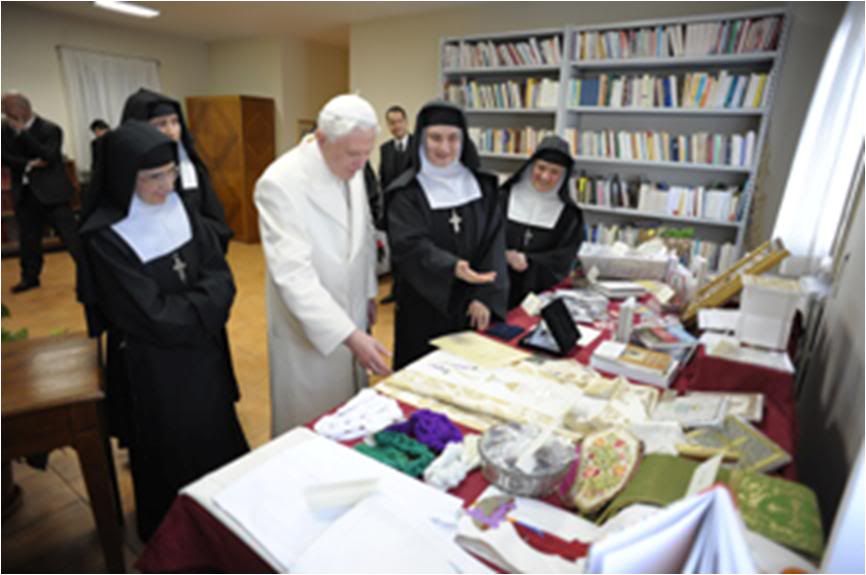
The nuns also presented the Pope with sacred accessories they had made to be donated to poor churches: 400 surplices, 400 stoles, 600 purificators [the cloth that a priest uses to wipe his lips after the Consecration], 500 rosaries, 400 copies in French of the Introduction to the devout life by St. Francis de Sales, and 2,000 scapulars of the Sacred Heart.
On Monday, Dec. 13, which was the feast of St. Lucia, Cardinal Marc Ouellet, prefect of the Congregation for Bishops, presided at the convent at the Eucharistic concelebration that closed the fourth centenary of the Visitation nuns.
'Dearest Visitation sisters," he said in his homily, "the Holy Father chose you to be near him as witnesses to the nuptial mystery of teh Church. Your presence and your contemplative fervor recall to all consecrated persons the essence of their vocation: the joyous and loving Yes to choosing the love of the Spouse".
The testimony of their two founders, Saints Francis de Sales and St. Jeanne Chantal, Cardinal Ouellet said, "remains very much present in the Church, especially in the interior dimension of love for God, obedience to his will, and the care of the poor who were so numerous in that tragic time of civil and religious wars during which they lived"
"In that difficult time," he said, "they were peacemakers, they sowed love where there was hatred and poverty. They humbly and patiently accepted the ecclesiastical restrictions of their time, which did not allow consecrated life for women outside of the cloister, thus reducing to a minimum their charitable outreach to the poor. But through all this, they showed obedience and spiritual fecundity, two fruits of authentic love".
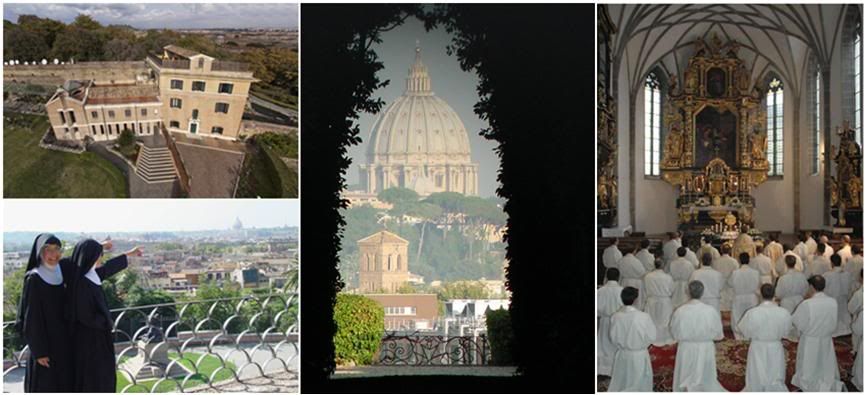 The Mater Ecclesiae convent in the Vatican Gardens.
The Mater Ecclesiae convent in the Vatican Gardens.
[Modificato da TERESA BENEDETTA 15/12/2010 02:17] |
| |
 15/12/2010 04:59 15/12/2010 04:59 |
|
| | | OFFLINE | | Post: 21.689
Post: 4.324 | Registrato il: 28/08/2005
Registrato il: 20/01/2009 | Administratore | Utente Master | |
|

 Lella has posted more of the articles from the December issue of the Italian journal of ideas, Formiche, which has a special section dedicated to Benedict XVI's Pontificate and why it has been the subject of so many attacks from the secular world as well as from within the Church. The author of the following essay is a professor of the History of Medieval Philosophy at the University of Rome III, and is an editorial writer for Il Riformista.
A masterly Magisterium:
Lella has posted more of the articles from the December issue of the Italian journal of ideas, Formiche, which has a special section dedicated to Benedict XVI's Pontificate and why it has been the subject of so many attacks from the secular world as well as from within the Church. The author of the following essay is a professor of the History of Medieval Philosophy at the University of Rome III, and is an editorial writer for Il Riformista.
A masterly Magisterium:
The roots of Christianity
in Benedict XVI's thought
by Benedetto Ippolito
Translated from the December 2010 issue of

In the days following the election of Benedict XVI to Peter's Chair, many observers prophesied that his Pontificate would surely leave a markedly ecclesiological imprint.
This was based on important publications, well known to scholars, by Cardinal Ratzinger on the subject of the Church. Among them a magnificent book from 1967 stands out, entitled Nuovo popolo di Dio (The new People of God), a collection of essays which present a synthesis of the evolution of Professor Ratzinger's theological ideas on the Church, as it matured during his work in the Second Vatican Council in the 1062-1965.
But the permanent effort of Benedict XVI's Magisterium has been to return Christianity to its authentic roots, rekindling the awareness of the faithful in the importance of matching their personal faith to an understanding of Revelation.
Elsewhere, Joseph Ratzinger's thought has carried the constant conviction that there cannot be theology without the Church, and that, moreover, the Church cannot exist without that primacy of the sacramental dimension which assures that she maintains the original spirit of Christianity.
And so it may be useful to reflect on some fundamental aspects of Benedict XVI's profound vision of the Church, even by just concentrating on some particularly stimulating essays.
In his lectures and essays, Cardinal Ratzinger often effectively proposed systematic and decisive theses proposing masterly theological syntheses, matured in contact with the great tradition of Scholasticism.
An outstanding example is the address he gave when he was confered a Doctorate in Theology by the University of Breslau, in Poland, which was later published in the 2002 book La communione nella
chiesa, under the title 'Faith and Theology".
His principal argument is a strategic starting point for our analysis, as it proves the close connection that esists between Christian theology and the material existence of the Church. The essay provides a 'plastic' definition of the idea of 'belief'.
Fauth as a personal act implies direct access to a truth one believes in, which is grasped and interiorized openly only by 'believing'. This seems to produce a lacerating paradox: How could a truth one believes in, if it is incertain, guide a person's entire life?
The response requires the ability to be able to clearly distinguish the correct definition of belief that arises solely from faith, from other kinds of assent based only on provisional opinion.
Scholastic tradition can be of help. St. Thomas in De veritate, affirmed that faith is halfway between doubt and scientific certainty. From the first, it takes the element of trust and expectation, from the second, firmness in the content of a belief which comes from the authoritative value of truth.
This means asserting, like St. Augustine, that human intelligence, through faith, arrives at truth which is at the same time transcendent and rational, unreachable and available.
This is the primitive and original link that exists between faith and theology, or to use the words of St. Bonaventure, between the credible and the intelligible. In short, that Revelation when understood and received is open to the free understanding of everyone.
The theological experience of truth is, therefore, inseparable from the Church. Verification rests on the essential persuasion that what unites theology and the Church is the kind of truth meant by announcing the Kingdom of God.
In a book entitled La Chiesa, from 1991, Joseph Ratzinger explains, with precise theological arguments, that the entire New Testament confirms the origin and prividential nature of the institution. "Jesus came to reunite all those who had been dispersed", starting from the Jewish idea according to which the KIngdom of God consists in gathering and purifying the People of God.
And that is why, Joseph Ratzinger argued, "the work of the Church is to convoke the People of God, for whom everything becomes one thing only".
Thus it is clear why there cannot be a personal experience of the faith without one's communitarian belonging to the Church, in which, precisely, the People of God are united in order to find salvation.
This explains the use St. Paul makes of Stoic and Platonic allegory in which Christianity is a system similar to a State or an organism similar to a living being.
These are metaphors to show that Jesus founded "a new People of God" whose end is the Church as a perfect community, visible and invisible, composed of different elements that are intimately linked and fitted together.
From this derives the constitutive function of the Sacraments which provide the unique and universal reference for the spousal union between God and the human race.
"The Eucharistic mystery," says the Pope, "is the nucleus of the concept of the Church and her definition as the Body of Christ."
On the other hand, one cannot ignore, in this case, the influence of the great meditation on interior spirituality by Romano Guardini in the maturation of Joseph Ratzinger's well-articulated ecclesiological concepts.
The result is a brilliant interpretation of the events narrated in the Acts of the Apostles. At Pentecost, God consecrates apostolic authority with the descent of the Holy Spirit, exalting the universla and catholic charism of the priesthood. It is an occasion which is of capital importance in grasping the specificity of the Roman Church with regard to other communitarian forms of Christian aggregation.
The Pope maintains that "on the basis of St. Luke, one must exclude the notion that what emerged in Jerusalem was a local Church, starting from which. gradually other local chuches would take shape. Rather, Luke wished to affirm that at the moment of her birth, the Church was already catholic - it was already universal" [implied in the gift of tongues that the Apostles manifested on that first Pentecost. But there are those who staunchly maintain that 'the local Church precedes the universal Church', such as Cardinal Walter Kasper in a running debate with Cardinal Ratzinger via publications in the 1990s - an obvious challenge to the central authority of Rome.]
What then is the resolving characteristic which gave the apostolic community the specific sign of being the universal Church? The answer resides in the primacy of Peter, placed by Jesus himself to safeguard the indissoluble and permanent unity of the People of God as a chosen community.
The fact of the Petrine primacy is concretely confirmed in many passages of the New Testament, cited naturally by Joseph Ratzinger in many of his works. [When he had no idea that he was ever going to be Pope!] His most interesting analysis is without a doubt that found in Chapter 6 of the book mentioned above, La communione nella Chiesa, where the Pope offers an exceptional account of the theological work he carried out while he was in the CDF.
The essay, entitled "Ecclesiology of the Dogmatic Constitution 'Lumen geitum'" assures that the specificity characteristic of the Catholid tradition is the encounter of faith annd reason which elevates man to the supernatural, through the positive insertion of every baptized person into the eternal plan of salvation entrusted by God to the Church.
For Benedict XVI, it is Jesus himself, and only he, who instituted the Church in time, conferring on it an institutional nature consecrated by the Holy Spirit.
This has immense value, because it places the authority of the Pope above local communities as a sacred and public subject "which is the exact opposite of ecclesiological relativism".
In the end, the dynamic of personal faith can never be authentically fulfilled without the existence of a personal and communitarian connection with the divine isntitution of the Church, in which 'subsists', as Lumen gentium says, the one mystical Body of Christ personified by the Pope.
A conclusion which reiterates the theoretical core of the encyclical Mystici corporis of Pius XII, according to which the visible presence of the Roman Church cotnains the essence of that universality whose aim is that salvation may be truly at the disposition of faith and the historical freedom of all mankind.
[Modificato da TERESA BENEDETTA 15/12/2010 14:21] |
| |
 15/12/2010 12:57 15/12/2010 12:57 |
|
| | | OFFLINE | | Post: 21.690
Post: 4.325 | Registrato il: 28/08/2005
Registrato il: 20/01/2009 | Administratore | Utente Master | |
|

 Wednesday, December 15, Third Week of Advent
Wednesday, December 15, Third Week of Advent
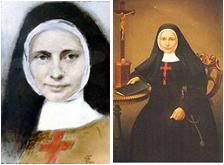 BLESSED MARIA FRANZISKA [Mary Frances] SCHERVIER (Germany, 1819-1875)
BLESSED MARIA FRANZISKA [Mary Frances] SCHERVIER (Germany, 1819-1875)
Born to a wealth family in Aachen, she was cured of asthma after a pilgrimage to Lourdes.
As a teenager, she ran the household when her mother died, and after losing two sisters to
tuberculosis, she became a lay Franciscan renowned for her generosity to the poor. In 1851,
she founded the Sisters of the Poor of St. Francis, which set up hospitals and homes for
the aged to serve the indigent. By 1858, the order had a branch in the United States, and
in 1863, Mother Mary Frances herself went to the US to help nurse Civil War wounded, making
a second trip to the order in 1868. By the time she died, her order had 2500 members in many
countries. She was beatified by Paul VI in 1974. Readings for today's Mass:
www.usccb.org/nab/readings/121510.shtml
OR today.
No papal photos on Page 1 - the only papal story in this issue is the Pope's visit to the Visitation nuns who are the Vatican's resident contemplatives (story translated and posted 3 posts above). Page 1 stories: A meditation on Advent taken from the last homily of one of the Cistercian monks in Tibbhirine, Algeria, before they were kidnapped and eventually killed in May 1995; civil war threatens the Ivory Coast where a defeated president refuses to accept teh result of a recent election; Prime Minister Silvio Berlusconi narrowly wins a vote of confidence in Parliament - student protesters assail Parliament and clash with riot police; a federal judge rules Obama's mandatory health care unconstitutional for penalizing persons who do not wish to buy health insurance.
THE POPE'S DAY
General Audience today - The Holy Father's catechesis was on St. Veronica Giuliani, a 17th century
Capuchin Poor Clare, abbess and mystic, who received the stigmata and whose body has been incorrupt.
The Vatican announced that the Holy Father's message for the World Day of Peace on New Year's Day 2011
will be presented at a news conference tomorrow.
German President also
announces Pope's visit

BERLIN, Dec. 15 (AP) - Germany's President says Pope Benedict XVI will visit the country in September 2011.
Benedict has visited his native Germany twice since becoming Pope in 2005, but this will be his first official state visit.
President Christian Wulff said Tuesday it is a "great joy" for him to welcome the head of the Roman Catholic Church in Germany during his four-day visit to the cities of Berlin, Freiburg and Erfurt.
The 83 years-old Benedict, who was once Archbishop of Munich, will be visiting Germany from Sept. 22 to Sept. 25.
Then, there's this odd report from a Romanian online newspaper in English- odd considering that the Holy Father's travel plans for 2011 have been apparently finalized:
Pope could visit Romania next year

Dec. 14, 2010
BUCHAREST - An invitation from Patriarch Daniel, the head of the Romanian Orthodox Church, could bring Pope Benedict XVI on an official visit next year, according to Foreign Minister Teodor Baconschi.
The foreign minister said he hoped the Orthodox Church Holy Assembly will approve the invitation to be extended during Patriarch Daniel’s visit to the Vatican next year. [OK, so the invitation will be extended next year - not the trip itself!]
A spokesman of the Romanian patriarchy said the Holy Assembly had approved the invitation in principle last June, but “details of the visit have to be diplomatically established between the Romanian state and the Vatican, as well as agreed upon by the Romanian Patriarchy and the Catholic Church” - not usually considered a simple protocol procedure when it involves an official visit by the Pope.
In May 1999, Pope John Paul II visited Romania in the first papal trip to a predominantly Orthodox country.
[Modificato da TERESA BENEDETTA 15/12/2010 15:09] |
| |
 15/12/2010 17:48 15/12/2010 17:48 |
|
| | | OFFLINE | | Post: 21.691
Post: 4.326 | Registrato il: 28/08/2005
Registrato il: 20/01/2009 | Administratore | Utente Master | |
|
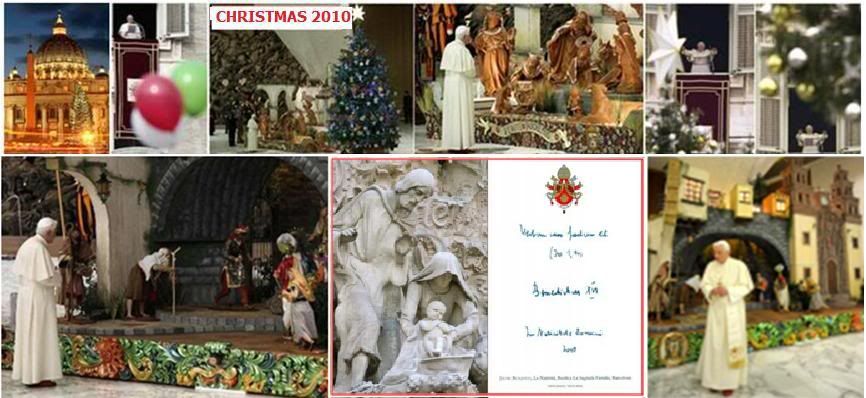 Pope's 2010 Christmas card features
Pope's 2010 Christmas card features
relief image from Sagrada Familia basilica
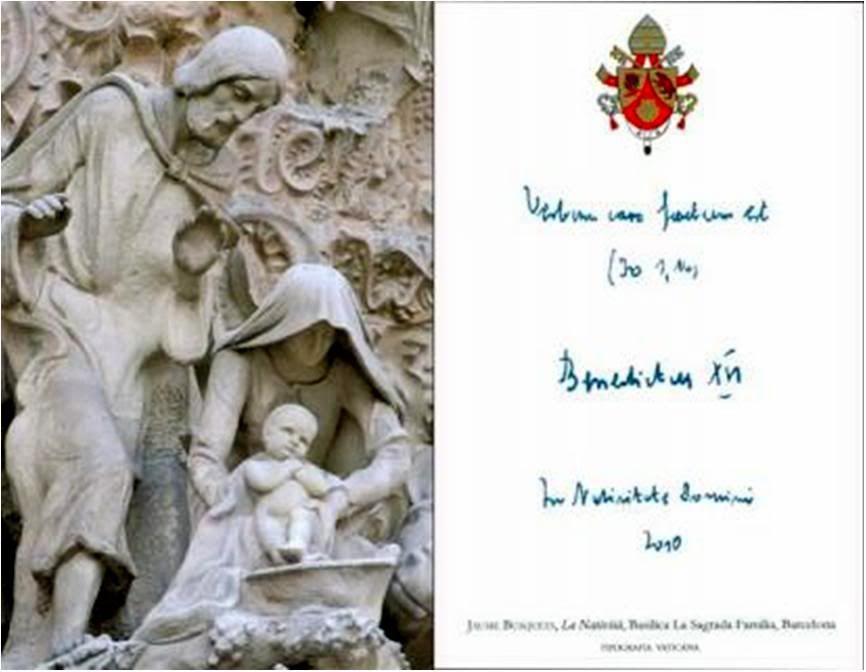 Enlarged from a thumbnail on the site of the Archbdiocese of Barcelona.
Enlarged from a thumbnail on the site of the Archbdiocese of Barcelona.
VATICAN CITY, DEC. 12, 2010 (Zenit.org).- Benedict XVI's Christmas card this year features the Basilica of the Holy Family, which he himself consecrated in Barcelona last November.
A statement Friday from the Archdiocese of Barcelona stated that the Vatican had informed Cardinal Lluís Martínez Sistach, the archbishop of Barcelona, that the Pope's greeting cards will feature "a significant element of the church" designed by Spanish architect Antoni Gaudí (1852-1926).
For the Archdiocese of Barcelona the gesture "highlights [the Pontiff's] affection for the archdiocese and the very positive impression he took with him of Barcelona," the note stated.
The archdiocese also revealed a letter Benedict XVI had sent to Cardinal Martínez Sistach to thank him for the attentions he received during his overnight stay in Barcelona from Nov. 6-7.
Upon returning to Rome, the Holy Father recalled in a letter the "joyful ecclesial and spiritual experience of my pastoral visit to Barcelona, where I had the good fortune to dedicate the wonderful church of the Sacred Family and declare it a minor basilica, as well as to share deeply the hopes of all those who form part of the splendid Obra Benefico-Social Nen Deu" [diocesan center named for the Infant Jesus, caring for Downs children and handicapped adults].
In his letter, dated Nov. 9, the Pontiff also entrusted all the people of the archdiocese "to the protection of Mary Most Holy, Our Lady of Mercy" and imparted to them his apostolic blessing.
[Modificato da TERESA BENEDETTA 19/12/2010 00:29] |
| |
 15/12/2010 18:09 15/12/2010 18:09 |
|
| | | OFFLINE | | Post: 21.692
Post: 4.327 | Registrato il: 28/08/2005
Registrato il: 20/01/2009 | Administratore | Utente Master | |
|
 GENERAL AUDIENCE TODAY
GENERAL AUDIENCE TODAY
Catechesis on St. Veronica Giuliani
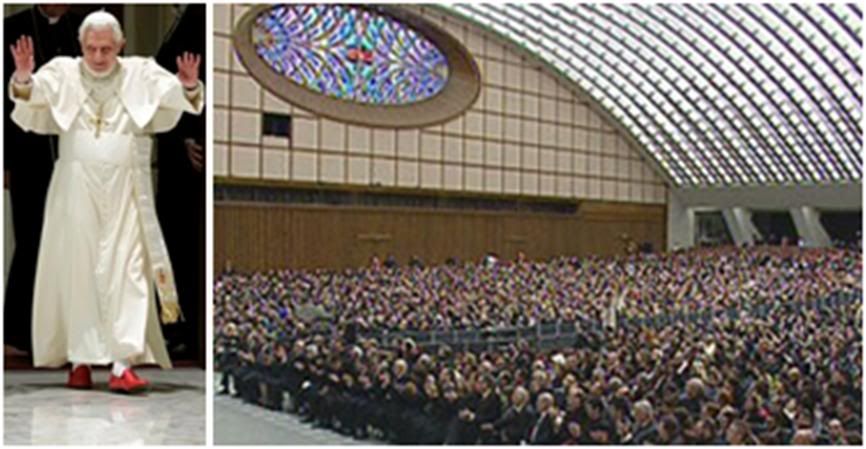
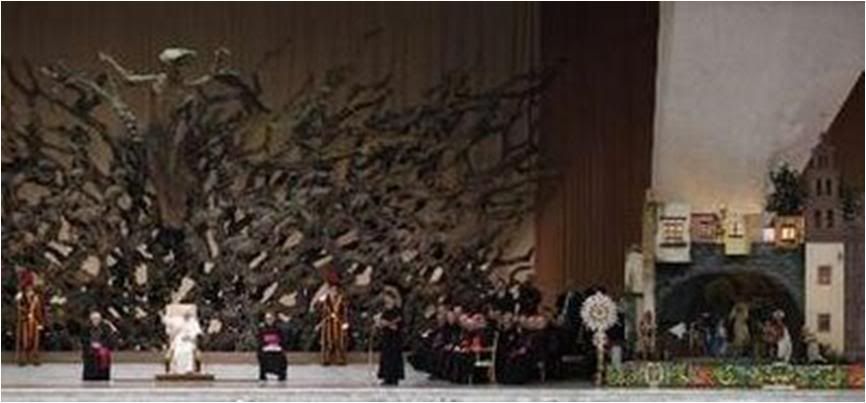 Pope on finding love
Pope on finding love
and saving souls

15 DEC 2010 (RV) - Plummeting temperatures forced the Wednesday audience indoors this week but failed to dampen the Advent spirit as thousands of pilgrims filled the Paul VI audience hall, gazing curiously at the Mexican nativity scene that has been installed there, and listening to the notes of the famous Italian ‘zampognari’, or Alpine pipers, who descend into the cities to announce the coming of Christmas.
Arriving to cheers and applause, Pope Benedict greeted the faithful and then spoke to them about nurturing true love in our lives, to become true images of the crucified Christ. His thoughts were inspired by a female saint - a 17th-century Italian religious and mystic, St. Veronica Giuliani.
Here is how he summarized the catechesis in English:
Our catechesis today deals with Saint Veronica Giuliani, a Capuchin Poor Clare and mystic who was born three hundred and fifty years ago this month.
Saint Veronica, true to the name she took in religion, became a "true image" of Christ crucified; her configuration to the Lord was accompanied by profound mystical experiences such as her crowning with thorns and the stigmata.
Veronica’s spirituality, as revealed above all in her Diary, is Christ-centred and spousal: she saw all things in the light of Christ’s love, manifested in his Passion, and she united herself to his self-oblation to the Father for the salvation of souls.
Her love of the Scriptures was deeply linked to her love of the Church and her strong sense of the communion of the saints. Veronica’s passionate mystical experience can be summed up in the words she spoke on her deathbed: "I have found Love".
May the life and teaching of Saint Veronica Giuliani inspire us to grow in union with the Lord and his Church, and to share in Christ’s loving concern for the salvation of sinners.
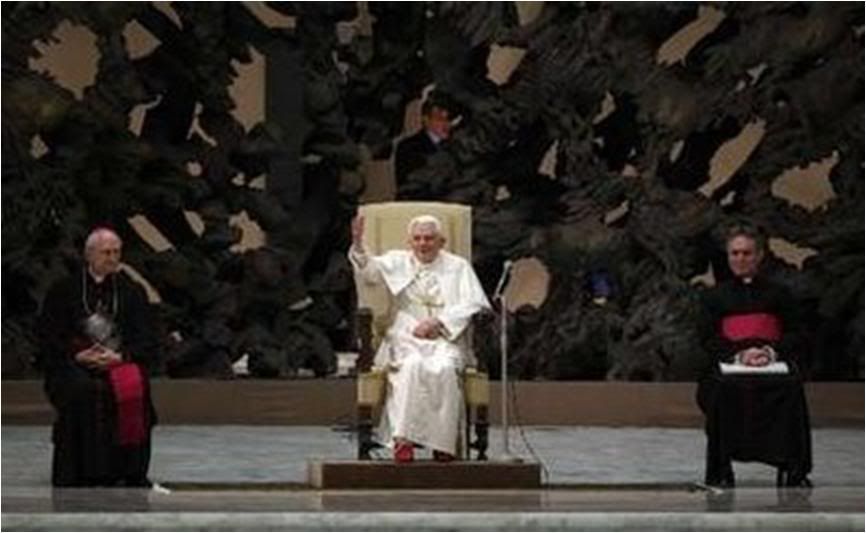

St. Veronica Giuliani is among the saints whose bodies have remained incourrpt.
Dear brothers and sisters,
Today, I wish to present a mystic who is not from the Middle Ages - St. Veronica Giuliani, a Capuchin Poor Clare nun. This is because December 27 will mark the 350th anniversary of her birth. Citta di Castello, where she lived longest and died, as well as Mercatello, her hometown, and the diocese of Urbino are observing this anniversary with joy.
Veronica was born in Mercatello, in the Metauro valley, in 1660, to Francesco Giuliani and Benedetta Mancini. Baptized Orsola, she was the youngest of seven sisters, of whom another three embraced monastic life. At age 7, she lost her mother, and her father transferred to Piacenza as customs superintendent of the Duchy of Parma. In this city, Orsola felt a growing desire to dedicate her life to Christ.
The desire became increasingly urgent, and at age 17, she entered the strictly cloistered life of the Capuchin Poor Clares in Citta di Castello, where she would remain for the rest of her life.
She took the name Veronica, which means 'true image', and in effect, she herself became a true image of the Crucified Christ. One year later, she took her final solemn vows. Thus began for her a journey of configuration to Christ through many penitences, great suffering and some mystical experiences linked to the Passion of Christ: coronation with thorns, mystical betrothal, a wound in the heart, and the stigmata.
In 1716, at age 56, she became the abbess of the monastery and was continuously confirmed in that office until she died in 1727, after a most painful agony of 33 days, which culminated in profound joy, such that her last words were, "I have found Love - Love has made itself seen! This is the cause of my suffering. Tell this to everyone!"
(Summarium Beatificationis, 115-120).
On July 9, she let her earthly dwelling to encounter God. She was 67, 50 years of which she spent in that monastery in Citta del Castello. She was proclaimed a saint in 1839 by Pope Gregory XVI.
Veronica Giuliani wrote a great deal: letters, autobiographical accounts, poetry. But the principal source for reconstructing her thought is her Diary, begun in 1693 - some 22,000 handwritten pages which cover a 34-year period of cloistered life.
Her writing flows spontaneously and continuously, without any cancellations or corrections, nor any signs of distributing the material in chapters or parts according to a pre-established plan.
Veronica was not writing a literary work. Rather, she was obliged to write down her experiences by Fr. Girolamo Bastianelli, a Philippine (Neri?) religious, with the approval of the diocesan bishop, Antonio Eustachi.
St. Veronica's spirituality was markedly Christological-spousal: It is the experience of being loved by Christ, faithful and sincere Spouse, and the desire to respond with a love that was increasingly engaged and passionate.
She interpreted everything through love, which instilled in her a profound serenity. She lived everything in union with Christ, out of love for him, and with the joy of being able to demonstrate to him all the love that a creature is capable of.
The Christ to whom Veronica was profoundly united was the suffering Jesus of the Passion, Death and Resurrection - Jesus in the act of offering himself to the Father to save us.
This experience also gave rise to the saint's intense suffering for the Church, expressed in the form of prayer and offering. The saint lived in this perspective: she prayed, she suffered, she sought 'holy poverty', as someone 'expropriated', that is, in the loss of herself (cfr ibid., III, 523), precisely in order to be like Christ who gave all of himself.
In every page of her writings, Veronica commends someone to the Lord, availing of her prayers of intercession to offer herself for every suffering. Her heart opened up to "all the needs of the Holy Church", and anxiously lived the desire for salvation "of all the universe' (ibid., III-IV, passim).
Veronica cries out: "Oh sinners, come all of you to the heart of Jesus; come to be washed in his most precious Blood... He awaits you with open arms to embrace you" (ibid., II, 16-17).
Animated by ardent charity, she gave her sisters in the convent her attention, understanding and forgiveness. She offered her prayers and sacrifices for the Pope, his bishops and priests, and all needy persons, including the souls in Purgatory.
Her own words summarized her contemplative mission as follows: "We cannot go out preaching in the world to convert souls, but we are obliged to pray continually for all the souls who have offended God... especially with our sufferings, with the principle of crucified life" (ibid., IV, 877).
Our saint conceived this mission as "being midway" between men and God, between sinners and the Crucified Christ. She profoundly lived in participation with the suffering love of Jesus, certain that 'suffering with joy' is the 'key to love' (cfr ibid., I, 299.417; III, 330.303.871; IV, 192).
She believed that Jesus suffers for the sins of men, but also for the sufferings that his faithful servants had to bear through the centuries, in the Church, because of their solid and consistent faith.
She wrote: "His eternal Father makes him see and feel all the sufferings that had to be undergone by his chosen ones, the souls dearest to him, those who availed of His Blood and all his sufferings" (ibid., II, 170).
As the Apostle Paul said of himself: "Now I rejoice in my sufferings for your sake, and in my flesh I am filling up what is lacking in the afflictions of Christ on behalf of his body, which is the Church" (Col 1,24).
Veronica arrived at asking Jesus to be crucified with him: "In one moment, I saw emerging from your most holy wounds these resplendent rays, and all struck my face. And I saw these rays become like little flames. In four of them were nails, and in one was the lance, like gold, all aflame: and it went through my heart, from one side to the other... and the nails went through my hands and feet. I felt great pain, but in that very pain, i saw and felt myself totally transformed in God" (Diario, I, 897).
The saint was convinced that she already took part in the Kingdom of God, but at the same time, she invoked all the saints of thecelestial homeland to come to her help in her earthly journey in expectation of eternal beatitude - this was the constant aspiration of her life (cfr ibid., II, 909; V, 246).
With respect to the preaching in her time, which was not uncommonly focused on 'saving the soul' in individual terms, Veronica showed a strong sense of brotherhood, of communion with all her brothers and sisters journeying towards heaven. And she lived, prayed and suffered for all.
But she considered the penultimate earthly things, though appreciated in the Franciscan sense as gifts of the Creator, as relative, and completely subordinate to God's 'taste' under the sign of radical poverty.
In the communio sanctorum [the communion of saints], she clarified their donation to the Church, as well as the relationship between the pilgrim Church and the heavenly Church.
"All the saints," she wrote, "are with us through the merits and the passion of Jesus; but in everything that Our Lord has done, they cooperated, such that their life was all ordered and ruled by his own works" (ibid., III, 203).
In Veronica's writings, we find many Biblical citations, sometimes indirect references but always to the point: she reveals a familiarity with the sacred texts, which nourished her spiritual experience.
It must also be pointed out that the high points of Veronica's mystical experience were never separate from the salvific events celebrated in the liturgy, in which there is a special place for proclaiming and listening to the Word of God. Thus Sacred Scripture illumines, purifies and confirms the experience of Veronica, making it ecclesial.
On the other hand, her personal experience, anchored to Sacred Scripture with uncommon intensity, led to a more profound and 'spiritual' reading of the same Scripture, by entering into the hidden depths of the Text. She does not only express herself with the words of Sacred Scripture, she truly lived the words, which became alive in her.
For example, our saint often cites an expression by St. Paul: "If God is for us, who can be against us?" (Rm 8,31; cfr Diario, I, 714; II, 116.1021; III, 48).
In her, assimilation of this Pauline text, of his great trust and profound joy, became a fact that was fulfilled in her own person: "My soul has been linked to the divine will, and I am truly established and will forever be in God's will, and I say to myself: 'Nothing can separate me from the will of God, not anguish, nor pain, nor travails, nor contempt, nor temptations, nor creatures, nor demons, nor darkness, and not even death itself, because in life and in death, I want everything to be the will of God" (Diario, IV, 272).
And thus we can be certain that death is not the last word - we are fixed to God's will and therefore, we are truly alive for always.
Veronica reveals herself to be a particularly courageous witness of the beauty and power of God's love, which drew her in, pervaded her and set her on fire. It was Love crucified that was imprinted on her flesh, as in St. Francis of Assisi, with the stigmata of Christ.
"'My spouse', the crucified Christ murmurs to me, 'the penitences you make for those who are in disgrace with me are dear to me'; then taking off one arm from the Cross, he signals me to approach his side... And I find myself in the arms of the Crucified One. I cannot describe what I feel at that point: I would have wanted to stay forever by his most blessed side" (ibid., I, 37).
That is also an image of her spiritual journey, of her interior life: to be in the embrace of the Crucified Lord, and thus to be in Christ's love for the sake of others.
But even with the Virgin Mary, Veronica had a relationship of profound intimacy, which she attests to by the words she heard Our Lady say one day, as she reports in her Diary: "I will make you rest on my breast, you will be in union with my soul, and it will be as if you were transported in flight before God" (IV, 901).
St. Veronica Giuliani invites us to grow, in our Christian life, in union with the Lord by being for others, abandoning ourselves to his will with total and complete trust, and in union with the Church, bride of Christ.
She invites us to participate in the suffering love of the Crucified Jesus for the salvation of all sinners. She invites us to keep our gaze intent on Paradise, the goal of our earthly journey, where we shall live with so many brothers and sisters the joy of full communion with God. She invites us to nourish ourselves daily with the Word of God in order to warm our hearts and orient our lives.
The last words of the saint may be considered the synthesis of her passionate mystical experience: "I have found Love - Love has allowed himself to be seen!"
Thank you.
In Spanish, the Holy Father had a special greeting for
...the members of the Mexican Catholic community in Rome and the artisans who came from Guanajato, accompanied by the governor of their state and the Archbishop of Leon, whom I thank for their gift of this artistic Nativity scene.
And in Italian:
...to the faithful of the diocese of Citta del Castello, accompanied by the bishop, Mons. Domenico Cancian, who are preparing to celebrate the 350th anniversary of the birth of their townmate, Saint Veronica Giuliani.
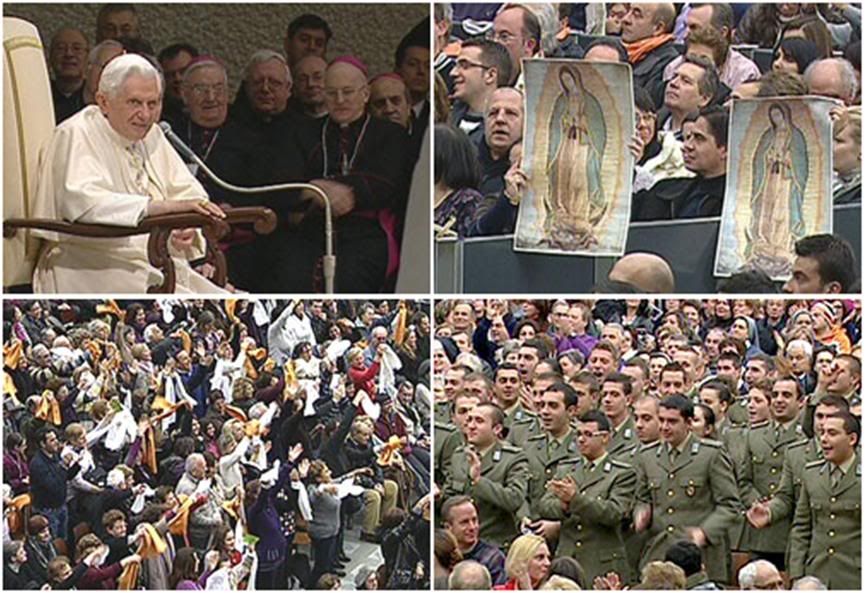
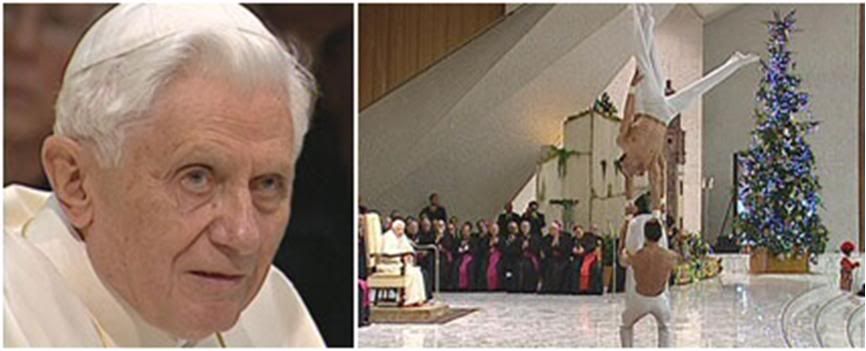
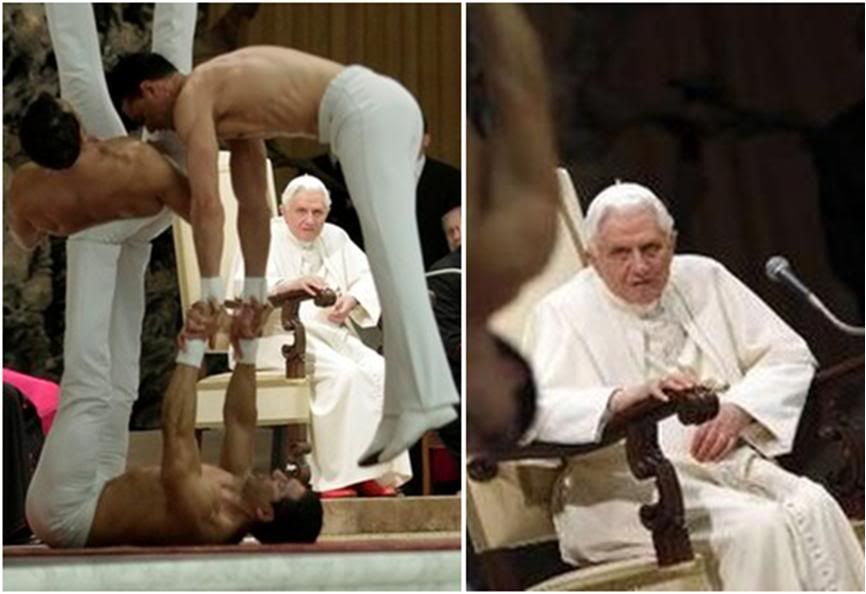
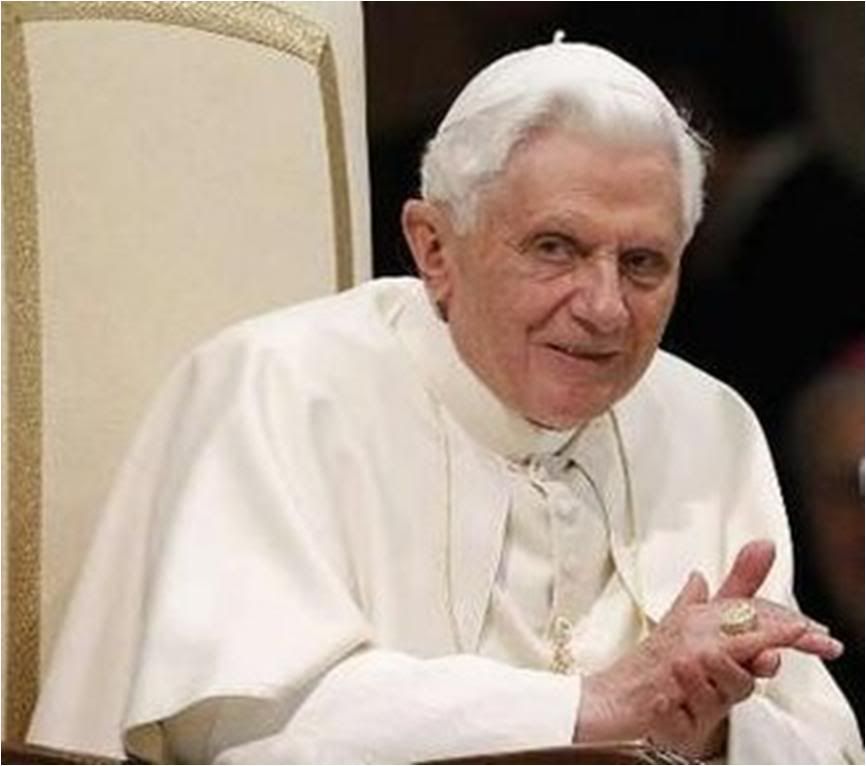
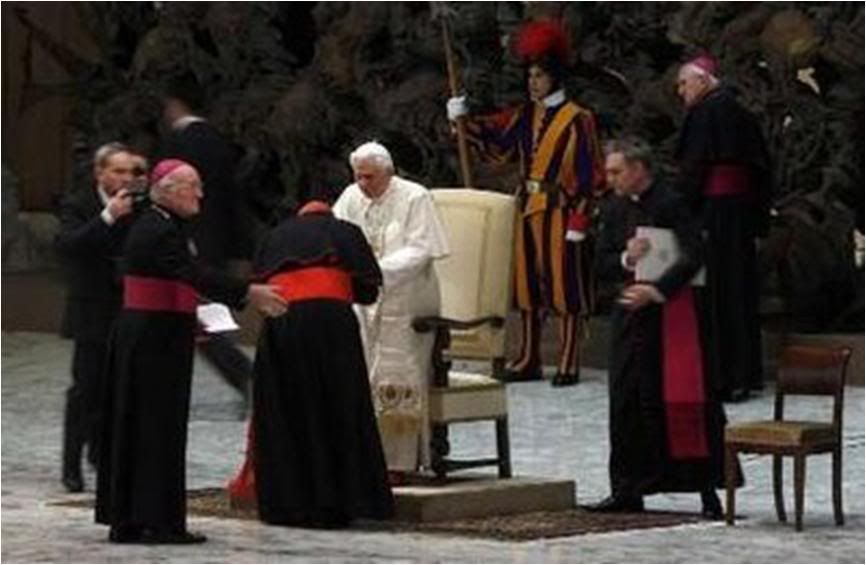
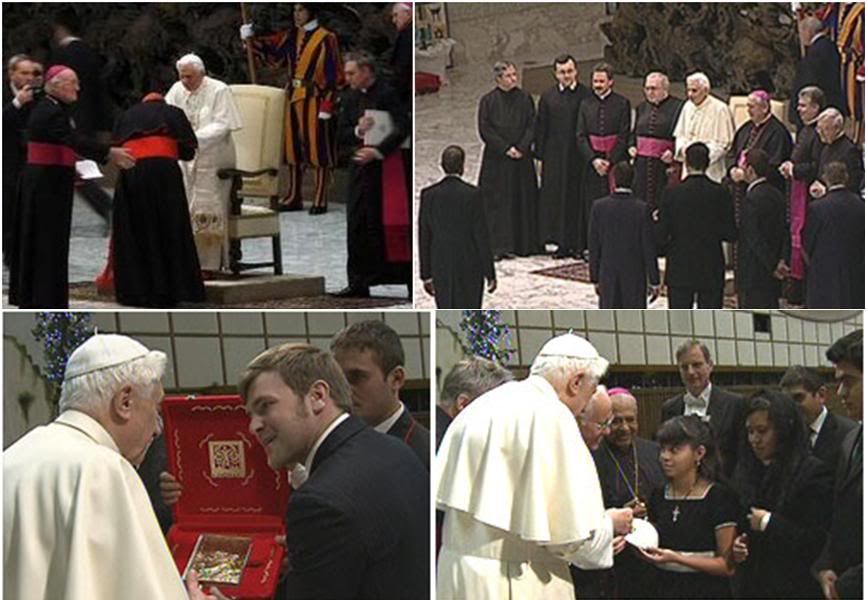
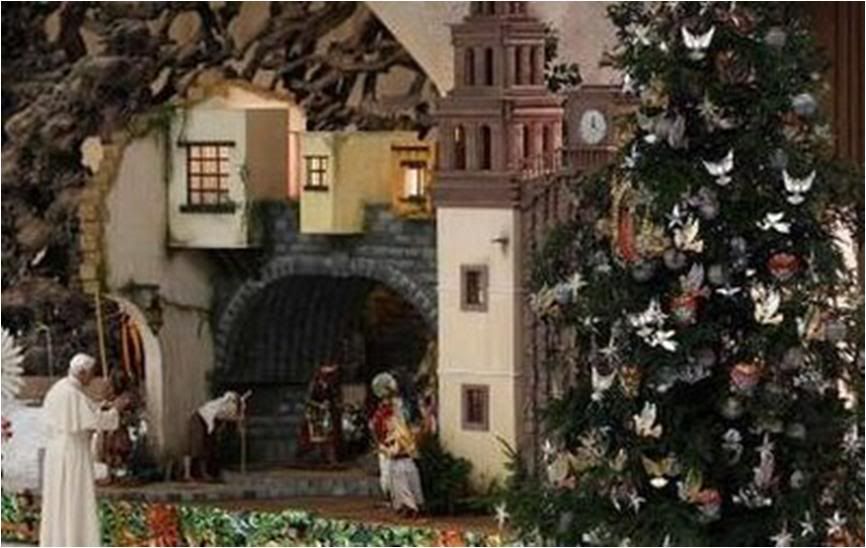
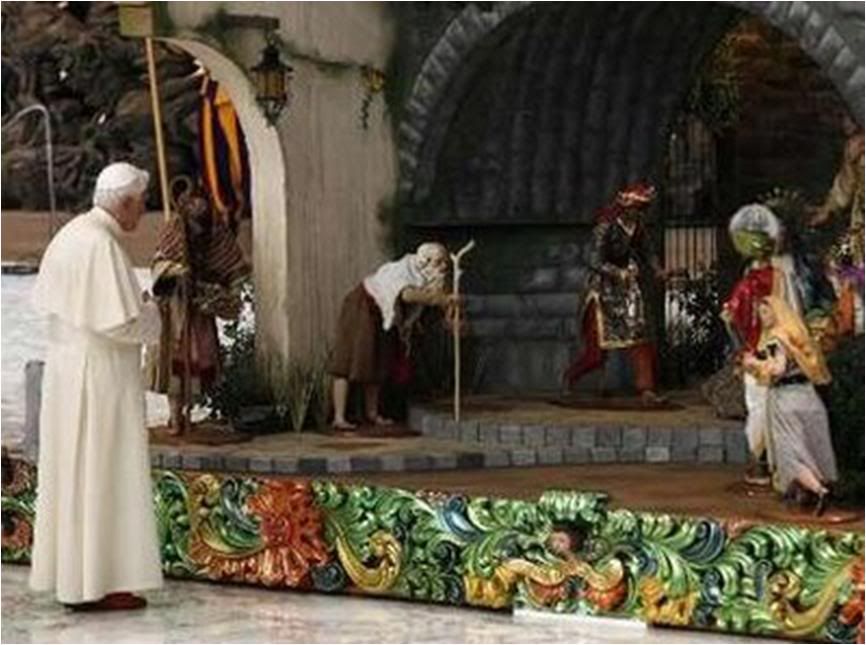
[Modificato da TERESA BENEDETTA 15/12/2010 22:00] |
| |
 16/12/2010 02:15 16/12/2010 02:15 |
|
| | | OFFLINE | | Post: 21.693
Post: 4.328 | Registrato il: 28/08/2005
Registrato il: 20/01/2009 | Administratore | Utente Master | |
|
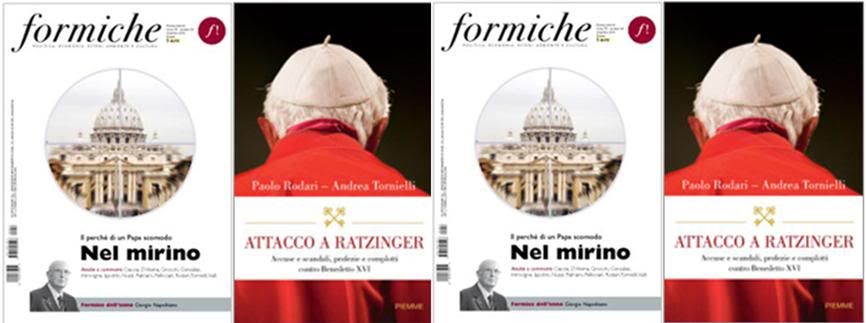 Here's another article from the Formiche special section on why an 'inconvenient' Pope is in the crosshairs of his enemies:
Benedict's calm response
Here's another article from the Formiche special section on why an 'inconvenient' Pope is in the crosshairs of his enemies:
Benedict's calm response
to the attacks against him
by Massimo Introvigne
Translated from the December 2010 issue of

Benedict XVI is a Pope who is much loved by many Catholics. But he has been under harsh attack by various international media as well as by a small but active minority within the Church. I wish to reflect on these attacks in dialog with an important book, Attacco a Ratzinger - about accusations, 'scandals', prophecies and conspiracies against Benedict XVI.
The first offensive against the Pope began with the Regensburg lecture on September 12, 2006, in which he used a quotation from the Byzantine Emperor Manuel II Paleologue (1350-1425), which many thought offensive to Islam and Muslims.
It sparked a huge campaign against Benedict XVI, stoked by both the Western media and by Islamic fundamentalism, and which degenerated into some violent episodes. In Mogadishu, Somalia, it caused the death of an Italian nun.
Paradoxically, the deep motivations for the quotation about Islam in the Regensburg lecture were understood by many Muslim intellectuals, but continue to be ignored or not understood at all by the Western media.
What emerges about the anti-Benedict attacks is a three-stage process: a communications error by the Vatican, aggression by the secular media, and an essential role played by Catholics who are against Benedict XVI in supporting such aggression. We find this in all the other anti-Benedict episodes, with few variations.
Nonetheless, a new phase began in March 2009, with the Pope's first visit to Africa. On the flight bringing him to Cameroon, Benedict XVI answered a few questions from the newsmen on board. To a French TV journalist who asked him about AIDS, the Pope replied that the massive distribution of condoms does not resolve the problem but aggravates it.
The Pope was technically right [scientifically as well as pragmatically right], and in succeeding days, this would be confirmed by many leading epidemiological experts: By promoting sexual promiscuity and creating a false sense of security, anti-AIDS policies based on condom use alone have regularly aggravated the problem in many countries that have been the beneficiaries of widespread condom dumps.
But the Pope's response occupied international reporting during the entire trip, so that Europe and the United States were largely uninformed of what he said about the crisis in the African continent - his denunciation of the misdeeds committed against the Africans by the neo-colonial policies and practices of international institutions and many multi-national corporations. Could this have been the real reason [ for all the condom furor]? [If it was, then it was purely opportunistic, not planned. No one could have foretold that the Pope would make the statements he did about condoms!]
By now, it was not surprising to see the usual progressive theologians go to battle against the Pope. The new element was the intervention of governments: Spain, France and Germany asked the pope to apologize, and in the European Parliament, a resolution to censure the Pope did not pass but got 199 votes.
However, a similar measure in Belgium was voted by Parliament, eliciting a severe response from the Vatican, thus causing an unprecedented diplomatic crisis between the two states. In turn, this led to the hostile raids against Church premises in Brussels by the Belgian police in connection with investigation of sex abuses by priests.
But all the other crises pale compared to the 'pedophile priest scandal'. Forgive me for referring to my text, but the authors of Attacco a Ratzinger amply cited material from my book Prete Pedofili (San Paolo, Cinisello Balsamo, 2010), substantially sharing its premises.
The book by Rodari and Tornielli reiterates, despite the absurd criticisms that have come from, unfortunately, even cardinals and bishops, what I had underscored: the one prelate in the Church who was most severe in his attitude against pedophile priests - to the point of being accused of violating the priests' right to self-defense and to have confronted many bishops about this matter - was Cardinal Ratzinger when he was Prefect of the Congregation for the Doctrine of the Faith.
To present him as having been tolerant at all on this issue is simply ridiculous, and yet this misinformation finds credence with the less informed [and the gullible] among newspaper readers or TV viewers.
On the other hand, we can ask whether the obstacles that Cardinal Ratzinger met in the final years of John Paul II's Pontificate - when his requests for even greater severity against priest offenders were not always welcomed, much less accepted - could cast a shadow on the great Polish Pope and even risk compsomising his cause for beatification.
However, the issue was confronted in the Vatican phase of the pre-beatification investigations. And it was rightly concluded that any such brakes on Cardinal Ratzinger's intentions were limited to the last years of John Paul II's Pontificate, when, due to failing health, he no longer followed most Vatican affairs personally and delegated them to various co-workers, against whom any criticisms should be directed.
Finally, Rodari and Tornielli examine whether one can properly speak of a conspiracy against the Pope, citing various opinions including mine, who am one of those they interviewed for the book.
The first is the galazy composed of secular lobbyists, homosexuals, Masons, feminists, pharmaceutical companies who sell contraceptives, and lawyers who hope to claim mega-million damages suing the Church on behalf of the victims of sex-offender priests.
However, this galaxy, too complex for it to respond to a single leadership, has the advantage of the new information technologies that give them a power possessed by no other enemy of the Church throughout history, and whose components all see the Pope as the one single obstruction to their dictatorship of relativism, in which God and the values of life and the family do not count at all. They see the Pope as an obstacle who must be swept away at all costs and by any means.
This lobby has been successful because they have enlisted a second circle of enemies made up of Catholic progressivists and those Catholics, theologians and not a few bishops, who see their authority and power in the Church threatened by Benedict XVI dismantling the interpretation of Vatican II as discontinuity and rupture with tradition - an interpretation upon which they have built their careers and fortunes for decades.
Interviews with Catholic progresivists allow the secular media to present their propaganda not as anti-Catholic but as being in support of Catholics who oppose a reactionary Pope who wants to 'abolish the Council' - by which they mean, one who disputes their claim to represent the 'spirit of Vatican II', since after all, anti-Catholic journalists have no knowledge of the texts of Vatican II, and the progressives themselves think the Vatican II documents are irrelevant.
Then, Benedict XVI has a third enemy - unwitting and involuntary but no less dangerous. The authors refer to "attacks that are involuntarily self-generated by the numerous imprudences and frequent errors of the Pope's own co-workers".
There are, of course, various opinions regarding the communications problems of the Vatican in this age of the Internet, Facebook, and mobile phones directly linked to the Web - resulting in hundreds of millions receiving instant information round the clock seconds after anything is posted online (and becoming archiva material after only a few hours).
If a false report is not denied within a couple of hours, or if an attack is not answered at least within 24 horus from when it is launched, the chances of making any effective response are down to practically zero.
If all this is true, then the opinions of those who lament that the present Vatican spokesman, Fr. Federico Lombardi, has been much less sharp and alert than his predecessor, layman Joaquin Navarro-Valls, can be debated ad infinitum but do not go to the heart of the problem.
The means of communication itself that have changed radically, a change that came after the death of John Paul II, because of the increasing number of people - 500 million Facebook users alone - and not just a small elite, who have access 24/7 to information on the Web, and have a reaciton time of minutes not hours. On this point, the book by Italian journalist Marco Niada, Il breve tempo (Garzanti, 2010) shoudl be read by all those involved in Vatican communications.
Benedict XVI is certainly not unaware of all these attacks. He is very interested in the new information technologies and in the need to improve the communications strategies of the Holy See.
But he is also very calm. He is willing to consider all the problems presented to the Church by the communications revolution - a revolution that is perhaps no less important that the 19060s revolution in morals and authority - but not to be taken over by them.
He insists that the salvation of a persecuted Church will not come from strategizing or diplomacy or technology - although these are all important and must not be neglected - but in fidelity to prayer, to meditation, to the Crucified Christ.
It is probable that he is right not only on the spiritual level, obviously, but even in cultural and sociological terms, in that the Church is not supposed to imitate dominant models but to be herself.
Yet not everyone, including many Catholics, seem to understand this.
[Modificato da TERESA BENEDETTA 16/12/2010 09:49] |
| |
 16/12/2010 10:05 16/12/2010 10:05 |
|
| | | OFFLINE | | Post: 21.694
Post: 4.329 | Registrato il: 28/08/2005
Registrato il: 20/01/2009 | Administratore | Utente Master | |
|
 Still catching up on all the items I missed seeing in the past few days. Here are two most encouraging reports as the Church in the United Kingdom follows up on the success of the Holy Father's visit last September:
Arhbishop of Birmingham says
Still catching up on all the items I missed seeing in the past few days. Here are two most encouraging reports as the Church in the United Kingdom follows up on the success of the Holy Father's visit last September:
Arhbishop of Birmingham says
'Holy Father's visit has
given us fresh courage

Dec. 12, 2010
"The four days of the Papal Visit brought the Catholic Church in England and Wales to a different and new place, emphasising and enhancing the opportunity we have to live and proclaim our faith in public," said Archbishop Bernard Longley of Birmingham during his homily at a special Mass on the Solemnity of the Immaculate Conception of the Blessed Virgin (8 December).
"The Holy Father has given us fresh courage to witness to the truth of the Gospel and to speak out against all that demeans human beings within our society," emphasised the Archbishop in the Metropolitan Cathedral and Basilica of St Chad, Birmingham.
"Pope Benedict has also given us Blessed John Henry Newman as someone to whom we can relate as we look for the kindly light of faith to help us negotiate our way through the complexities of contemporary life. Cardinal Newman reflected on the doctrine of the Immaculate Conception of our Lady in the context of his own journey of faith in becoming a Catholic," added Archbishop Longley.
His Eminence Cardinal Cormac Murphy-O'Connor, Emeritus Archbishop of Westminster, who Presided at the Mass, reminded the congregation that he was present exactly one year earlier at the Installation of Archbishop Longley. "Now a year later I am back to see how he is getting on and he is doing very well," said the Cardinal.
Father Longley was Ordained to the Sacred Priesthood by the then Bishop Murphy-O'Connor of Arundel and Brighton on 16 December 1980, as a priest of that diocese. His Episcopal Ordination by Cardinal Murphy-O'Connor took place in Westminster Cathedral on 24 January 2003 - following the announcement that Pope John Paul II had appointed him an auxiliary bishop in the Archdiocese of Westminster.
It was a bitterly cold morning outside St Chad's Cathedral. Inside a crescendo of sound filled this great Pugin architectural jewel, situated near Birmingham city centre, as everyone joined in singing Blessed John Henry Newman's famous hymn 'Praise to the Holiest in the Height', from his poem 'The Dream of Gerontius', set to music by Sir Edward Elgar.
It brought back vivid memories of the Papal Mass and Cardinal Newman's beatification ceremony by Pope Benedict XVI at Cofton Park in Birmingham less then 12 weeks earlier on Sunday 19 September.
At the start of Mass Archbishop Bernard Longley installed Father Gerry Breen, the Cathedral Dean, as a Canon of the Metropolitan Chapter of St Chad's Cathedral.
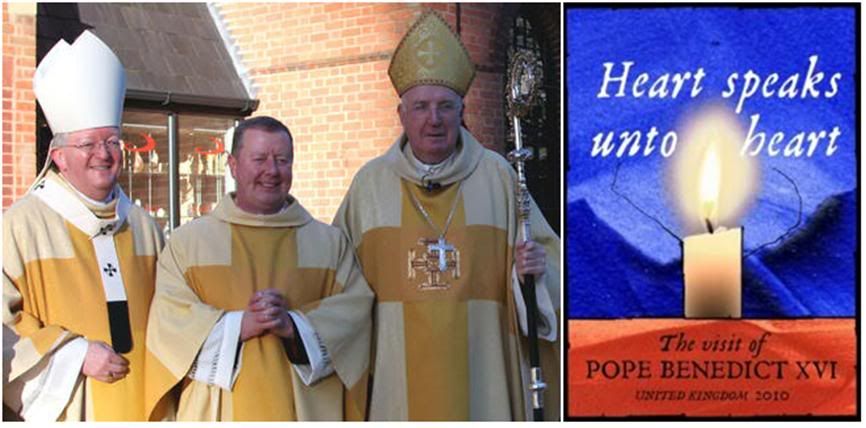
Bishop Longley, Canon Breen and Cardinal Murphy-O'Connor.
UK keeps light burning
after Pope's visit

LONDON, DEC. 13, 2010 (Zenit.org).- Across England and Wales, candles and pictures have been distributed to symbolize the legacy of Benedict XVI's September visit, which lit a light that is still burning strong.
Last Wednesday, on the Solemnity of the Immaculate Conception, representatives from various parishes gathered in Northampton Cathedral for a Mass of Thanksgiving for the Pope's visit.
At the Mass they were each given a candle and a picture that were blessed by the Pontiff during his visit.
In his homily, Bishop Peter Doyle of Northampton affirmed, "Like Mary we have been chosen and called to be holy and spotless, and to live through love in the presence of Jesus."
He recalled: "That call to holiness was a major theme of the visit of Pope Benedict XVI to Britain in September. The Holy Father urged us to see that this vocation does not separate us from the world but encourages us to engage more fully in the world, bringing the grace of God into all aspects of our lives.
"He taught that religion has a large part to play in our society and that all people of faith have an important and necessary contribution to make to the common good.
"The Holy Father called us to enter into dialogue confidently with other churches, other faiths and the state."
The prelate noted that "the Holy Father's visit has given us more confidence" to "speak from the heart of Jesus to the hearts of all people."
"It has also helped to give fresh impetus to our identity as Catholics, as experienced by ourselves and seen by others," the bishop said.
He affirmed that all of the bishops "want to strengthen this identity which is rooted in the gift of faith and which is the wellspring of much generosity."
As Bishop Doyle gave the items to the parish representatives, he blessed them, saying, "May God, who sent his Son into the world as the Light that shines in the dark, help you to bring his light to the world."
In the Diocese of Hexham and Newcastle, parish representatives gathered for a liturgy on Oct. 24, World Mission Sunday, where they also were given the blessed candles and pictures to bring back to their churches.
The parishioners were encouraged to display the picture, which depicts Christ knocking on a door, and to light the candles during parish meetings, catechetical gatherings, prayer groups, and other events.
Karen Burbridge, a coordinator of the Rite of Christian Initiation of Adults (RCIA) in Newcastle, is one ministry leader who has used these items in her program.
"It has been such a privilege to be able to use the lovely candle and picture as a focal point during our RCIA meetings in Newcastle," she said.
Burbridge continued, "RCIA is for people enquiring about the Catholic Faith and our enquirers were indeed fascinated by the picture, and moved by the metaphor it creates of Jesus knocking at the door of our heart and bringing us light -- they were also enthralled to be in some way connected to the recent Papal Visit."
[Modificato da TERESA BENEDETTA 16/12/2010 13:54] |
| |
 16/12/2010 10:54 16/12/2010 10:54 |
|
| | | OFFLINE | | Post: 21.695
Post: 4.330 | Registrato il: 28/08/2005
Registrato il: 20/01/2009 | Administratore | Utente Master | |
|
 Too bad the OR never provides photos of these interesting sidelights...
Sidelights from the GA:
Too bad the OR never provides photos of these interesting sidelights...
Sidelights from the GA:
The Pope gets a miraculous hawthorn
that has flowered in mid-January
for the past seven centuries
Translated from the 12/16/10 issue of

They came en masse from Citta di Castello for the Pope's catechesis on 'their' saint, Veronica Giuliani.
"Love and solidarity, key words for the mystic who is so loved by our people," said Bishop Domenico Cancian, "are also the pastoral coordinates for the diocese which safeguards her legacy. Benedict XVI's catechesis today will be the guide for the Jubilee Year decreed for the 350th anniversary of St. Veronica's birth, which will open with a Mass on December 27 celebrated by all the visits of the region of Umbria".
From London, Mons. Andrew Summersgill came with other members of the organizing committee for the Pope's visit last September, to present the Pope with two DVDs: one of the visit itself, and a second dedicated specifically to the beatification of Cardinal John Henry Newman.
Then, there was the governor of the Mexican state of Guanajuato, Juan Manuel Oliva Ramirez, who presented the Pope with the Nativity scene set up on the stage of the Aula Paolo VI which was designed and executed by Mexican artisans in the tradition of their state,
A delegation of citizens from Gualdo Tadini, another Umbrian city located between Perugia and Gubbio, presented the Pope with a hawthron bush for the Vatican Gardens, from a species that since 1342, has flowered inexplicably and punctually in mid-January.
Tradition has it that on the death of Blessed Angelo, who was a devout hermit, the hawthorn bushes along his funeral route miraculously burst into bloom despite the fact that it was January 14 (mid-winter).
The children of Italian Catholic Action (Azione Cattolica Ragazzi, ACR) were back to greet the Holy Father, this time with a 'special gift': Beatrice of San Benedetto del Tronto, and Leonardo and Rebecca of Tivoli, gave him ACR ID Card No. 1, a gesture particularly gratifying for the 83-year-old Pope.
The Pope also greeted members of the Commission Quo principia of the Congregation for Divine Worship who are translating the Roman Missal into German.
Two new books were given to the Pope. The first is dedicated to the Martyrology of the Church 'in the Second World War and under Communism', presented by Fr. Ante Bakovic, who was a witness to the Communist persecutions himself. He was accompanied by the Bishop of Sartajevo, Cardinal Pulijic.
Journalist and author Andrea Tornielli presented the Pope with the book Benedetto XVI, il Papa della gioia, published by SystemEuropa in a limited edition of 500 copies.
Fr. Giuseppe Colombara, director of the Osservatore Romano photogrpahic sefvice, presented the Pope with a diary book for 2011 illustrated by the most significant photos from the Or archives.
Before all the above, however, four brothers - Erdeo, Natale, Andrea and Ivan Pellegrini - 'body balance' artists of international fame - gave a brief performance for the Pope. They are among the participants of a current congress in Rome on the pastoral care of circus workers under the auspices of the Pontifical Council for Migrants and Itinerant Workers.
[Modificato da TERESA BENEDETTA 19/12/2010 00:30] |
| |
 16/12/2010 12:17 16/12/2010 12:17 |
|
| | | OFFLINE | | Post: 21.696
Post: 4.331 | Registrato il: 28/08/2005
Registrato il: 20/01/2009 | Administratore | Utente Master | |
|

 I thought it was rather odd that there was no Amazon in Italy, but they've finally opened up shop on the Boot with an impressive full-blown debut...
Catholic books sell very well
I thought it was rather odd that there was no Amazon in Italy, but they've finally opened up shop on the Boot with an impressive full-blown debut...
Catholic books sell very well
on newly-opened Amazon.it
by Andrea Camaiora
Translated from

Dec. 15, 2010
The new digital technologies are determining fundamental changes in our models of communication and in human relations. These changes are particularly evident among young people who grew up in close contact with these new technologies and are therefore very much at ease in a digital world which is alien to us adults who have had to learn, understand and appreciate the opportunities that they represent for communications.
In this year's message, my thought goes especially to those who make up the so-called digital generation: With them, I wish to share some ideas on the extraordinary potential of the new technologies, if they are used to promote understanding and solidarity among all human beings.
These technologies are s true gift to mankind: Therefore, we must make sure that the advantages they offer be placed in the service of all human beings and all communities, especially those who are needy and vulnerable...
And though there is cause for wonder at the velocity with which these new technologies have evolved in terms of reliability and efficiency, their popularity with users must not surprise us, because they respond to the fundamental desire of people to enter into relationships with each other.
That is what Benedict XVI said two years ago in his message for the World Day of Social Communications. What would the Holy Father say today about the success of Catholic publications, particularly those signed Joseph Ratzinger or Benedict XVI, which one can gauge clearly by a quick visit to Amazon.it, the world's largest online shopping site which has finally 'opened its doors' in Italy.
The site itself is a 'gift for mankind' and another occasion for the ambitious challenge of a new evangelization of the West.
Amazon.it offers even books that are difficult to acquire from actual bookstores, and at great discounts.
Right now, if you searched for 'Benedict XVI', it turns up 545 titles, written by him or about him, many by authors explaining the greatness of his Pontificate. And the catalog keeps growing - it had grown from 506 on Sunday to 645 today...
In any case, you can buy Light of the World from Amazon for 3.17 euro, against 19.50 in bookstores. And two titles from the Harmony collection - GESU DI NAZARET for 5.60 euro, and La musica: Un'arte familiare al Logos for 7 euro.
You can also find rarities from other Popes like Il mistero della trasfigurazione, by Paul VI, for 1.45 euro; and the complete Discorsi (speeches) of Pius XII for 37.16 euro.
A search for 'Bible' will get you 9,830 choices, from versions for children to specialized books like La Bibbia nella letteratura italiana. A search for Jesus yields 4491 books, DVDs and music, and 3434 if your search word is 'Christ'.
In the early period of the Church, the Apostles and their disciples brought the Good News of Jesus to the Greco-Roman world. Just as then, evangelization in order to be fruitful required attentive understanding of the culture and customs of those pagan peoples in order to be able to touch their hearts and minds, the announcement of Jesus today through the new technologies presupposes a knowledge of them in order to use them appropriately and well.
On you, young people, who almost spontaneously find yourselves in tune with the new communications means, rests a particular responsibility for the task of New Evangelization in the 'digital continent'. Learn to do it with enthusiasm in proclaiming the Gospel to your contemporaries.
Benedict XVI has once again indicated the right way. It is for Catholics to follow him, and one way is to avail of the opportunities offered by the world's largest virtual bookstore.
[Modificato da TERESA BENEDETTA 16/12/2010 12:19] |
| |
 16/12/2010 14:23 16/12/2010 14:23 |
|
| | | OFFLINE | | Post: 21.697
Post: 4.332 | Registrato il: 28/08/2005
Registrato il: 20/01/2009 | Administratore | Utente Master | |
|

 Banner shows B16-Ratzinger books published by Ignatius in 2009-2010 alone.
When the Pope speaks,
Banner shows B16-Ratzinger books published by Ignatius in 2009-2010 alone.
When the Pope speaks,
this Napa resident publishes
by JENNIFER HUFFMAN

December 16, 2010
Not many business people can say they have the Pope as a client, but Mark Brumley of Napa can.
Brumley is chief executive officer of Ignatius Press of San Francisco, the English-language publisher of Pope Benedict XVI’s books, including the pope’s most recent, Light of the World.
Ignatius Press has been publishing books by the pope since 1983, when he was known as Cardinal Joseph Ratzinger, and before he became leader of the Roman Catholic church in 2005.
While it’s an honor to work with the pope, “There is a kind of humility in Joseph Ratzinger that makes you feel like this is no big deal,” Brumley said. “He’s very shy, but human and gentlemanly.”
Old-fashioned connections made the publishing relationship possible. The Rev. Joseph Fessio, founder of Ignatius Press, was Ratzinger’s student in the early 1970s.
“When (Ratzinger) became pope, we continued to publish his books,” Brumley said. Ignatius Press has published about four dozen books by Ratzinger. They include scholarly and theological works, official teachings of the Catholic church, personal opinions and devotional works.
“Obviously, his books have sold very well since he became Pope,” he said.
The way the Pope and publisher work together is a bit different than the relationship between most other authors and their editors. When the Pope has a new book to release, “The Vatican contacts us to see if we are interested. As you can suppose, we usually are,” Brumley said.
“Popes usually don’t write books per se,” Brumley said. “The vast majority of (Ratzinger’s) books since he became Pope are collections of his homilies and talks,” he explained.
The Pope’s latest book made headlines when it came out Nov. 24. Compiled from a week-long series of interviews with journalist Peter Seewald, Light of the World tackles some controversial issues including clergy sexual abuse in the Catholic church, dialogue with Islam, and condom use.
“This is the first time in the history of the Catholic church that the Pope has done an interview book like this,” Brumley noted.
He describes the book as a glimpse inside the papacy. “To hear him talk about topics like the global environmental crisis or the financial crisis or Islam is fascinating. People may think they know what he thinks, but they haven’t necessarily read what he’s written. I think this book challenges people’s preconceptions,” Brumley said.
The 249-page book has been a best-seller for the small publishing house, selling 40,000 copies in the first two weeks of release. “That’s a lot for any publishing company within two weeks. For us, that’s very good,” Brumley said. The publisher makes 8 percent of the revenues from the book, he said.
So how does a publisher edit the Pope? It turns out much of the heavy lifting has already been done by the Vatican’s own publishing house.
“Most of what we do is just take the translation provided and match it to our house style and format it,” Brumley said.
The CEO has lived in Napa for the past 14 years. He has taught at Catholic schools and worked for Catholic organizations in St. Louis and San Diego for the past 25 years.
Brumley, 49, is married with five children, all of whom attended Trinity Grammar and Prep in Napa.
The publisher said he has met the Pope three times in different meetings at the Vatican. “There is an odd mixture of feeling that you are in the presence of someone who is great, but you recognize he is just like the rest of us human beings,” he said.
[Modificato da TERESA BENEDETTA 16/12/2010 14:23] |
| |
 16/12/2010 15:20 16/12/2010 15:20 |
|
| | | OFFLINE | | Post: 21.698
Post: 4.333 | Registrato il: 28/08/2005
Registrato il: 20/01/2009 | Administratore | Utente Master | |
|
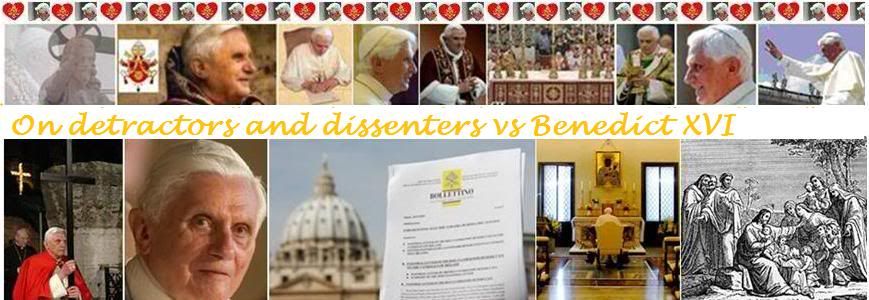 Of course, the world does not have to be told that the Pope, Successor of Peter, Vicar of Christ, spiritual leader of 1.2 billion Catholics and spokesman for the world's more than 2 billion Christians, is always 'a person who matters' in the contemporary world, just by being who he is - in the same way that the President of the United States, whoever he is, matters... But this year's TIME list of 'People who mattered' in 2010 includes the Pope for the wrong reasons - and with a write-up that is shot through with malicious inaccuracies that serve to perpetrate the black legend still being created by the media about Benedict XVI. What can ever be done about this inexorable media process of systematic mythification of malice????
Of course, the world does not have to be told that the Pope, Successor of Peter, Vicar of Christ, spiritual leader of 1.2 billion Catholics and spokesman for the world's more than 2 billion Christians, is always 'a person who matters' in the contemporary world, just by being who he is - in the same way that the President of the United States, whoever he is, matters... But this year's TIME list of 'People who mattered' in 2010 includes the Pope for the wrong reasons - and with a write-up that is shot through with malicious inaccuracies that serve to perpetrate the black legend still being created by the media about Benedict XVI. What can ever be done about this inexorable media process of systematic mythification of malice????
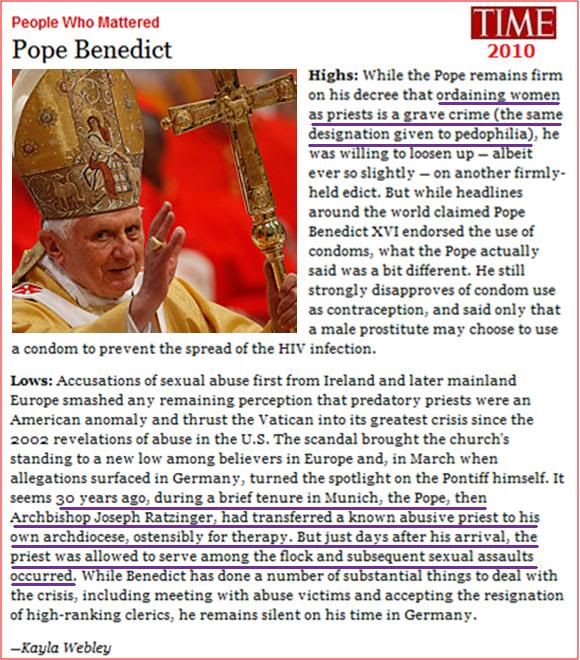 Apparently, someone at Catholic Culture reacted right away...
Time continues misrepresentation
Apparently, someone at Catholic Culture reacted right away...
Time continues misrepresentation
of Pope Benedict

December 15, 2010
In an issue that names Mark Zuckerberg, the founder of Facebook as the “Person of the Year,” Time magazine lists Pope Benedict among other important newsmakers, with a short piece that contains several glaring errors.
In reference to the Pope’s much-discussed statement on condom use in Light of the World, the Time article by Kayla Webley reports that the Pontiff “said only that a male prostitute may choose to use a condom to prevent the spread of the HIV infection.” That’s not quite what the Holy Father said. But the next paragraph of the Time piece is spectacularly misleading.
Time reports:
"It seems 30 years ago, during a brief tenure in Munich, the Pope, then Archbishop Joseph Ratzinger, had transferred a known abusive priest to his own archdiocese, ostensibly for therapy. But just days after his arrival, the priest was allowed to serve among the flock and subsequent sexual assaults occurred".
The facts:
•At the time in question, the future Pontiff held the title of Cardinal, not Archbishop. [He was both Cardinal - his rank in the Church, and Archbishop - his function at the time!]
•Cardinal Ratzinger allowed the notorious priest to live within the Munich archdiocese while receiving counseling. He was not transferred “ostensibly” for therapy; he was admitted to Munich for that purpose and that purpose only.
•The vicar general of the Munich archdiocese gave the priest a parish assignment without informing Cardinal Ratzinger. Notice how Time tries to finesse the question of responsibility by saying that he “was assigned’ — thus creating the inaccurate impression that Cardinal Ratzinger made the assignment.
The facts of the Munich case are now widely known. If Time does not present them accurately, the reader is left to wonder whether the reporting is malicious or merely incompetent. [Unfortunately, the average reader won't even wonder - he/she will just take it for granted that those are correct facts!]
|
| |
 16/12/2010 16:08 16/12/2010 16:08 |
|
| | | OFFLINE | | Post: 21.699
Post: 4.334 | Registrato il: 28/08/2005
Registrato il: 20/01/2009 | Administratore | Utente Master | |
|

 Thursday, December 16, Third Week of Advent
Thursday, December 16, Third Week of Advent
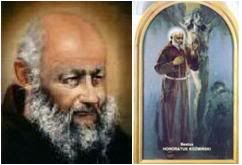 BLESSED HONORATUS KOZMINSKI (Poland, 1825-1916)
BLESSED HONORATUS KOZMINSKI (Poland, 1825-1916)
Capuchin, Founder of Congregations, Writer
Imprisoned as a teenager for allegedly taking part in a rebellion conspiracy,
he joined the Capuchins, and as a priest in Warsaw, devoted himself to
preaching, confessions, spiritual direction and working with lay Franciscans.
At age 30, he helped Blessed Angela Truszkowska establish the Felician
congregation. In 1864, Polish orders were suppressed after an assassination
plot on the Russian czar, and the clergy were expelled from Warsaw. Exiled
to another city, Zakroczym, he established 26 male and female congregations
who took vows but did not wear habits and lived among the people (17 still exist
today as secular institutes). His life was also marked by extensive writings,
particularly his sermons and letters, and 52 publications on ascetic theology.
In 1895, he was named Commissary-General for the Capuchins of Poland, but
in 1908, diocesan bishops took control over his congregations, whom he told
to obey. A contemporary said of him, "He always walked with God". He was
beatified in 1988.
Readings for today's Mass:
www.usccb.org/nab/readings/121610.shtml
OR today.
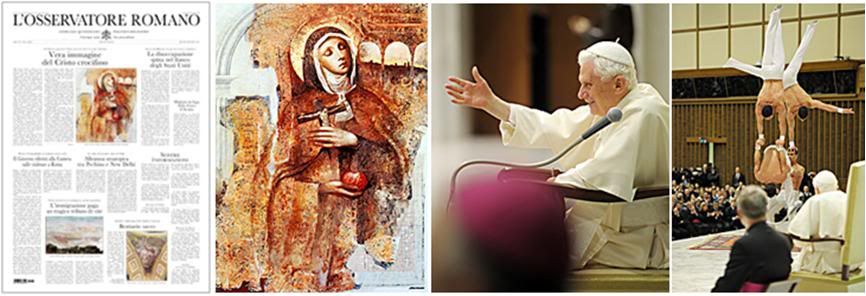
At the General Audience, the Pope speaks on St. Veronica Giuliani:
'True image of the Crucified Christ'
Other Page 1 stories: Unemployment continues to plague US economy; India and China announce strategic alliance in economic, trade and energy matters; Italian government investigates masterminds behind Tuesday riots in which some 2000 union thugs apparently incited 20,000 student protesters to confront Italian police, using a confidence vote in Parliament as a pretext, causing Rome's worst riots in years, with at least 150 wounded among policemen and rioters, and 20 million euros in damage; thousands flee the Ivory Coast because of a possible civil war caused by a president who refuses to accept electoral defeat; and dozens die as refugee boats carrying Iraqis and Iranians are wrecked off Australia's Christmas Island.
THE POPE'S DAY
The Holy Father met today with
- The new ambassadors from Nepal, Zambia, Andorra, Seychelles, and Mali, who presented their credentials.
Address in French.
- Cardinal Ivan Dias, Prefect of the Congregation for the Evangelization of Peoples (weekly meeting)
- Fr. José Rodríguez Carballo, Minister-Geeran of the Franciscan Order of Friars Minor
- Rev. Munib A. Younan, President of the World Lutheran Federation, and his delegation. Address in English.
In the afternoon, he presided at Vespers during the traditional Christmas encounter with university
students of Rome. Homily in Italian.
The Holy Father's Message for the World Day of Peace on January 1, 2011, was released at a news conference
at the Vatican today.
[Modificato da TERESA BENEDETTA 19/12/2010 00:31] |
| |
 16/12/2010 17:01 16/12/2010 17:01 |
|
| | | OFFLINE | | Post: 21.700
Post: 4.335 | Registrato il: 28/08/2005
Registrato il: 20/01/2009 | Administratore | Utente Master | |
|

1. At the beginning of the new year I offer good wishes to each and all for serenity and prosperity, but especially for peace. Sadly, the year now ending has again been marked by persecution, discrimination, terrible acts of violence and religious intolerance.
My thoughts turn in a special way to the beloved country of Iraq, which continues to be a theatre of violence and strife as it makes its way towards a future of stability and reconciliation.
I think of the recent sufferings of the Christian community, and in particular the reprehensible attack on the Syro-Catholic Cathedral of Our Lady of Perpetual Help in Baghdad, where on 31 October two priests and over fifty faithful were killed as they gathered for the celebration of Holy Mass.
In the days that followed, other attacks ensued, even on private homes, spreading fear within the Christian community and a desire on the part of many to emigrate in search of a better life.
I assure them of my own closeness and that of the entire Church, a closeness which found concrete expression in the recent Special Assembly for the Middle East of the Synod of Bishops. The Synod encouraged the Catholic communities in Iraq and throughout the Middle East to live in communion and to continue to offer a courageous witness of faith in those lands.
I offer heartfelt thanks to those Governments which are working to alleviate the sufferings of these, our brothers and sisters in the human family, and I ask all Catholics for their prayers and support for their brethren in the faith who are victims of violence and intolerance.
In this context, I have felt it particularly appropriate to share some reflections on religious freedom as the path to peace. It is painful to think that in some areas of the world it is impossible to profess one’s religion freely except at the risk of life and personal liberty.
In other areas we see more subtle and sophisticated forms of prejudice and hostility towards believers and religious symbols. At present, Christians are the religious group which suffers most from persecution on account of its faith.
Many Christians experience daily affronts and often live in fear because of their pursuit of truth, their faith in Jesus Christ and their heartfelt plea for respect for religious freedom.
This situation is unacceptable, since it represents an insult to God and to human dignity; furthermore, it is a threat to security and peace, and an obstacle to the achievement of authentic and integral human development.(1)
Religious freedom expresses what is unique about the human person, for it allows us to direct our personal and social life to God, in whose light the identity, meaning and purpose of the person are fully understood.
To deny or arbitrarily restrict this freedom is to foster a reductive vision of the human person; to eclipse the public role of religion is to create a society which is unjust, inasmuch as it fails to take account of the true nature of the human person; it is to stifle the growth of the authentic and lasting peace of the whole human family.
For this reason, I implore all men and women of good will to renew their commitment to building a world where all are free to profess their religion or faith, and to express their love of God with all their heart, with all their soul and with all their mind (cf. Mt 22:37).
This is the sentiment which inspires and directs this Message for the XLIV World Day of Peace, devoted to the theme: Religious Freedom, the Path to Peace.
A sacred right to life
and to a spiritual life
2. The right to religious freedom is rooted in the very dignity of the human person,(2) whose transcendent nature must not be ignored or overlooked.
God created man and woman in his own image and likeness (cf. Gen 1:27). For this reason each person is endowed with the sacred right to a full life, also from a spiritual standpoint.
Without the acknowledgement of his spiritual being, without openness to the transcendent, the human person withdraws within himself, fails to find answers to the heart’s deepest questions about life’s meaning, fails to appropriate lasting ethical values and principles, and fails even to experience authentic freedom and to build a just society.(3)
Sacred Scripture, in harmony with our own experience, reveals the profound value of human dignity: "When I look at your heavens, the work of your fingers, the moon and the stars which you have established, what is man that you are mindful of him, and the son of man, that you care for him? Yet you have made him little less than God, and crowned him with glory and honour. You have given him dominion over the works of your hands; you have put all things under his feet" (Ps 8:3-6).
Contemplating the sublime reality of human nature, we can experience the same amazement felt by the Psalmist. Our nature appears as openness to the Mystery, a capacity to ask deep questions about ourselves and the origin of the universe, and a profound echo of the supreme Love of God, the beginning and end of all things, of every person and people.(4)
The transcendent dignity of the person is an essential value of Judeo-Christian wisdom, yet thanks to the use of reason, it can be recognized by all.
This dignity, understood as a capacity to transcend one’s own materiality and to seek truth, must be acknowledged as a universal good, indispensable for the building of a society directed to human fulfilment.
Respect for essential elements of human dignity, such as the right to life and the right to religious freedom, is a condition for the moral legitimacy of every social and legal norm.
Religious freedom
and mutual respect
3. Religious freedom is at the origin of moral freedom. Openness to truth and perfect goodness, openness to God, is rooted in human nature; it confers full dignity on each individual and is the guarantee of full mutual respect between persons.
Religious freedom should be understood, then, not merely as immunity from coercion, but even more fundamentally as an ability to order one’s own choices in accordance with truth.
Freedom and respect are inseparable; indeed, "in exercising their rights, individuals and social groups are bound by the moral law to have regard for the rights of others, their own duties to others and the common good of all".(5)
A freedom which is hostile or indifferent to God becomes self-negating and does not guarantee full respect for others. A will which believes itself radically incapable of seeking truth and goodness has no objective reasons or motives for acting save those imposed by its fleeting and contingent interests; it does not have an "identity" to safeguard and build up through truly free and conscious decisions.
As a result, it cannot demand respect from other "wills", which are themselves detached from their own deepest being and thus capable of imposing other "reasons" or, for that matter, no "reason" at all. The illusion that moral relativism provides the key for peaceful coexistence is actually the origin of divisions and the denial of the dignity of human beings.
Hence we can see the need for recognition of a twofold dimension within the unity of the human person: a religious dimension and a social dimension. In this regard, "it is inconceivable that believers should have to suppress a part of themselves – their faith – in order to be active citizens. It should never be necessary to deny God in order to enjoy one’s rights". (6)
The family -
school of freedom and peace
4. If religious freedom is the path to peace, religious education is the highway which leads new generations to see others as their brothers and sisters, with whom they are called to journey and work together so that all will feel that they are living members of the one human family, from which no one is to be excluded.
The family founded on marriage, as the expression of the close union and complementarity between a man and a woman, finds its place here as the first school for the social, cultural, moral and spiritual formation and growth of children, who should always be able to see in their father and mother the first witnesses of a life directed to the pursuit of truth and the love of God.
Parents must be always free to transmit to their children, responsibly and without constraints, their heritage of faith, values and culture.
The family, the first cell of human society, remains the primary training ground for harmonious relations at every level of coexistence, human, national and international. Wisdom suggests that this is the road to building a strong and fraternal social fabric, in which young people can be prepared to assume their proper responsibilities in life, in a free society, and in a spirit of understanding and peace.
A common patrimony
5. It could be said that among the fundamental rights and freedoms rooted in the dignity of the person, religious freedom enjoys a special status. When religious freedom is acknowledged, the dignity of the human person is respected at its root, and the ethos and institutions of peoples are strengthened.
On the other hand, whenever religious freedom is denied, and attempts are made to hinder people from professing their religion or faith and living accordingly, human dignity is offended, with a resulting threat to justice and peace, which are grounded in that right social order established in the light of Supreme Truth and Supreme Goodness.
Religious freedom is, in this sense, also an achievement of a sound political and juridical culture. It is an essential good: each person must be able freely to exercise the right to profess and manifest, individually or in community, his or her own religion or faith, in public and in private, in teaching, in practice, in publications, in worship and in ritual observances.
There should be no obstacles should he or she eventually wish to belong to another religion or profess none at all. In this context, international law is a model and an essential point of reference for states, insofar as it allows no derogation from religious freedom, as long as the just requirements of public order are observed.(7)
The international order thus recognizes that rights of a religious nature have the same status as the right to life and to personal freedom, as proof of the fact that they belong to the essential core of human rights, to those universal and natural rights which human law can never deny.
Religious freedom is not the exclusive patrimony of believers, but of the whole family of the earth’s peoples. It is an essential element of a constitutional state; it cannot be denied without at the same time encroaching on all fundamental rights and freedoms, since it is their synthesis and keystone. It is "the litmus test for the respect of all the other human rights".(8)
While it favours the exercise of our most specifically human faculties, it creates the necessary premises for the attainment of an integral development which concerns the whole of the person in every single dimension.(9)
The public dimension of religion
6. Religious freedom, like every freedom, proceeds from the personal sphere and is achieved in relationship with others. Freedom without relationship is not full freedom.
Religious freedom is not limited to the individual dimension alone, but is attained within one’s community and in society, in a way consistent with the relational being of the person and the public nature of religion.
Relationship is a decisive component in religious freedom, which impels the community of believers to practise solidarity for the common good. In this communitarian dimension, each person remains unique and unrepeatable, while at the same time finding completion and full realization.
The contribution of religious communities to society is undeniable. Numerous charitable and cultural institutions testify to the constructive role played by believers in the life of society. More important still is religion’s ethical contribution in the political sphere.
Religion should not be marginalized or prohibited, but seen as making an effective contribution to the promotion of the common good. In this context mention should be made of the religious dimension of culture, built up over centuries thanks to the social and especially ethical contributions of religion.
This dimension is in no way discriminatory towards those who do not share its beliefs, but instead reinforces social cohesion, integration and solidarity.
Religious freedom, a force for
freedom and civilization:
dangers arising from its exploitation
7. The exploitation of religious freedom to disguise hidden interests, such as the subversion of the established order, the hoarding of resources or the grip on power of a single group, can cause enormous harm to societies.
Fanaticism, fundamentalism and practices contrary to human dignity can never be justified, even less so in the name of religion. The profession of a religion cannot be exploited or imposed by force. States and the various human communities must never forget that religious freedom is the condition for the pursuit of truth, and truth does not impose itself by violence but "by the force of its own truth".(10) In this sense, religion is a positive driving force for the building of civil and political society.
How can anyone deny the contribution of the world’s great religions to the development of civilization? The sincere search for God has led to greater respect for human dignity.
Christian communities, with their patrimony of values and principles, have contributed much to making individuals and peoples aware of their identity and their dignity, the establishment of democratic institutions and the recognition of human rights and their corresponding duties.
Today too, in an increasingly globalized society, Christians are called, not only through their responsible involvement in civic, economic and political life but also through the witness of their charity and faith, to offer a valuable contribution to the laborious and stimulating pursuit of justice, integral human development and the right ordering of human affairs.
The exclusion of religion from public life deprives the latter of a dimension open to transcendence. Without this fundamental experience it becomes difficult to guide societies towards universal ethical principles and to establish at the national and international level a legal order which fully recognizes and respects fundamental rights and freedoms as these are set forth in the goals – sadly still disregarded or contradicted – of the 1948 Universal Declaration of Human Rights.
An issue of justice and civility:
fundamentalism and hostility to believers
compromise the positive secularity of states
8. The same determination that condemns every form of fanaticism and religious fundamentalism must also oppose every form of hostility to religion that would restrict the public role of believers in civil and political life.
It should be clear that religious fundamentalism and secularism are alike in that both represent extreme forms of a rejection of legitimate pluralism and the principle of secularity. Both absolutize a reductive and partial vision of the human person, favouring in the one case forms of religious integralism and, in the other, of rationalism.
A society that would violently impose or, on the contrary, reject religion is not only unjust to individuals and to God, but also to itself. God beckons humanity with a loving plan that, while engaging the whole person in his or her natural and spiritual dimensions, calls for a free and responsible answer which engages the whole heart and being, individual and communitarian.
Society too, as an expression of the person and of all his or her constitutive dimensions, must live and organize itself in a way that favours openness to transcendence. Precisely for this reason, the laws and institutions of a society cannot be shaped in such a way as to ignore the religious dimension of its citizens or to prescind completely from it.
Through the democratic activity of citizens conscious of their lofty calling, those laws and institutions must adequately reflect the authentic nature of the person and support its religious dimension. Since the latter is not a creation of the state, it cannot be manipulated by the state, but must rather be acknowledged and respected by it.
Whenever the legal system at any level, national or international, allows or tolerates religious or antireligious fanaticism, it fails in its mission, which is to protect and promote justice and the rights of all.
These matters cannot be left to the discretion of the legislator or the majority since, as Cicero once pointed out, justice is something more than a mere act which produces and applies law.
It entails acknowledging the dignity of each person11 which, unless religious freedom is guaranteed and lived in its essence, ends up being curtailed and offended, exposed to the risk of falling under the sway of idols, of relative goods which then become absolute.
All this exposes society to the risk of forms of political and ideological totalitarianism which emphasize public power while demeaning and restricting freedom of conscience, thought and religion as potential competitors.
Dialogue between civil
and religious institutions
9. The patrimony of principles and values expressed by an authentic religiosity is a source of enrichment for peoples and their ethos. It speaks directly to the conscience and mind of men and women, it recalls the need for moral conversion, and it encourages the practice of the virtues and a loving approach to others as brothers and sisters, as members of the larger human family.12
With due respect for the positive secularity of state institutions, the public dimension of religion must always be acknowledged. A healthy dialogue between civil and religious institutions is fundamental for the integral development of the human person and social harmony.
Living in love and in truth
10. In a globalized world marked by increasingly multi-ethnic and multi-religious societies, the great religions can serve as an important factor of unity and peace for the human family.
On the basis of their religious convictions and their reasoned pursuit of the common good, their followers are called to give responsible expression to their commitment within a context of religious freedom.
Amid the variety of religious cultures, there is a need to value those elements which foster civil coexistence, while rejecting whatever is contrary to the dignity of men and women.
The public space which the international community makes available for the religions and their proposal of what constitutes a "good life" helps to create a measure of agreement about truth and goodness, and a moral consensus; both of these are fundamental to a just and peaceful coexistence.
The leaders of the great religions, thanks to their position, their influence and their authority in their respective communities, are the first ones called to mutual respect and dialogue.
Christians, for their part, are spurred by their faith in God, the Father of the Lord Jesus Christ, to live as brothers and sisters who encounter one another in the Church and work together in building a world where individuals and peoples "shall not hurt or destroy … for the earth shall be full of the knowledge of the Lord as the waters cover the sea" (Is 11:9).
Dialogue as a shared pursuit
11. For the Church, dialogue between the followers of the different religions represents an important means of cooperating with all religious communities for the common good.
The Church herself rejects nothing of what is true and holy in the various religions. "She has a high regard for those ways of life and conduct, precepts and doctrines which, although differing in many ways from her own teaching, nevertheless often reflect a ray of that truth which enlightens all men and women".(13)
The path to take is not the way of relativism or religious syncretism. The Church, in fact, "proclaims, and is in duty bound to proclaim without fail, Christ who is the way, the truth and the life (Jn 14:6); in Christ, in whom God reconciled all things to himself, people find the fullness of the religious life".(14)
Yet this in no way excludes dialogue and the common pursuit of truth in different areas of life, since, as Saint Thomas Aquinas would say, "every truth, whoever utters it, comes from the Holy Spirit".(15)
The year 2011 marks the twenty-fifth anniversary of the World Day of Prayer for Peace convened in Assisi in 1986 by Pope John Paul II. On that occasion the leaders of the great world religions testified to the fact that religion is a factor of union and peace, and not of division and conflict.
The memory of that experience gives reason to hope for a future in which all believers will see themselves, and will actually be, agents of justice and peace.
Moral truth in
politics and diplomacy
12. Politics and diplomacy should look to the moral and spiritual patrimony offered by the great religions of the world in order to acknowledge and affirm universal truths, principles and values which cannot be denied without denying the dignity of the human person.
But what does it mean, in practical terms, to promote moral truth in the world of politics and diplomacy? It means acting in a responsible way on the basis of an objective and integral knowledge of the facts; it means deconstructing political ideologies which end up supplanting truth and human dignity in order to promote pseudo-values under the pretext of peace, development and human rights; it means fostering an unswerving commitment to base positive law on the principles of the natural law.(16)
All this is necessary and consistent with the respect for the dignity and worth of the human person enshrined by the world’s peoples in the 1945 Charter of the United Nations, which presents universal values and moral principles as a point of reference for the norms, institutions and systems governing coexistence on the national and international levels.
Beyond hatred and prejudice
13. Despite the lessons of history and the efforts of states, international and regional organizations, non-governmental organizations and the many men and women of good will who daily work to protect fundamental rights and freedoms, today’s world also witnesses cases of persecution, discrimination, acts of violence and intolerance based on religion.
In a particular way, in Asia and in Africa, the chief victims are the members of religious minorities, who are prevented from freely professing or changing their religion by forms of intimidation and the violation of their rights, basic freedoms and essential goods, including the loss of personal freedom and life itself.
There also exist – as I have said – more sophisticated forms of hostility to religion which, in Western countries, occasionally find expression in a denial of history and the rejection of religious symbols which reflect the identity and the culture of the majority of citizens.
Often these forms of hostility also foster hatred and prejudice; they are inconsistent with a serene and balanced vision of pluralism and the secularity of institutions, to say nothing of the fact that coming generations risk losing contact with the priceless spiritual heritage of their countries.
Religion is defended by defending the rights and freedoms of religious communities. The leaders of the great world religions and the leaders of nations should therefore renew their commitment to promoting and protecting religious freedom, and in particular to defending religious minorities; these do not represent a threat to the identity of the majority but rather an opportunity for dialogue and mutual cultural enrichment.
Defending them is the ideal way to consolidate the spirit of good will, openness and reciprocity which can ensure the protection of fundamental rights and freedoms in all areas and regions of the world.
Religious freedom in the world
14. Finally I wish to say a word to the Christian communities suffering from persecution, discrimination, violence and intolerance, particularly in Asia, in Africa, in the Middle East and especially in the Holy Land, a place chosen and blessed by God.
I assure them once more of my paternal affection and prayers, and I ask all those in authority to act promptly to end every injustice against the Christians living in those lands. In the face of present difficulties, may Christ’s followers not lose heart, for witnessing to the Gospel is, and always will be, a sign of contradiction.
Let us take to heart the words of the Lord Jesus: "Blessed are those who mourn, for they shall be comforted … Blessed are those who hunger and thirst for righteousness, for they shall be satisfied … Blessed are you when men revile you and persecute you and utter all kinds of evil against you falsely on my account. Rejoice and be glad, for your reward is great in heaven" (Mt 5:4-12).
Then let us renew "the pledge we give to be forgiving and to pardon when we invoke God’s forgiveness in the Our Father. We ourselves lay down the condition and the extent of the mercy we ask for when we say: ‘And forgive us our debts, as we have forgiven those who are in debt to us’ (Mt 6:12)".(17)
Violence is not overcome by violence. May our cries of pain always be accompanied by faith, by hope and by the witness of our love of God.
I also express my hope that in the West, and especially in Europe, there will be an end to hostility and prejudice against Christians because they are resolved to orient their lives in a way consistent with the values and principles expressed in the Gospel.
May Europe rather be reconciled to its own Christian roots, which are fundamental for understanding its past, present and future role in history; in this way it will come to experience justice, concord and peace by cultivating a sincere dialogue with all peoples.
Religious freedom,
the path to peace
15. The world needs God. It needs universal, shared ethical and spiritual values, and religion can offer a precious contribution to their pursuit, for the building of a just and peaceful social order at the national and international levels.
Peace is a gift of God and at the same time a task which is never fully completed. A society reconciled with God is closer to peace, which is not the mere absence of war or the result of military or economic supremacy, much less deceptive ploys or clever manipulation.
Rather, peace is the result of a process of purification and of cultural, moral and spiritual elevation involving each individual and people, a process in which human dignity is fully respected.
I invite all those who wish to be peacemakers, especially the young, to heed the voice speaking within their hearts and thus to find in God the stable point of reference for attaining authentic freedom, the inexhaustible force which can give the world a new direction and spirit, and overcome the mistakes of the past.
In the words of Pope Paul VI, to whose wisdom and farsightedness we owe the institution of the World Day of Peace:
"It is necessary before all else to provide peace with other weapons – different from those destined to kill and exterminate mankind. What are needed above all are moral weapons, those which give strength and prestige to international law – the weapon, in the first place, of the observance of pacts".(18)
"Religious freedom is an authentic weapon of peace, with an historical and prophetic mission. Peace brings to full fruition the deepest qualities and potentials of the human person, the qualities which can change the world and make it better. It gives hope for a future of justice and peace, even in the face of grave injustice and material and moral poverty.
"May all men and women, and societies at every level and in every part of the earth, soon be able to experience religious freedom, the path to peace!"
From the Vatican
8 December 2010

1] Cf. BENEDICT XVI, Encyclical Letter Caritas in Veritate, 29, 55-57.
[2] Cf. SECOND VATICAN ECUMENICAL COUNCIL, Declaration on Religious Freedom Dignitatis Humanae, 2.
[3] Cf. BENEDICT XVI, Encyclical Letter Caritas in Veritate, 78.
[4] Cf. SECOND VATICAN ECUMENICAL COUNCIL, Declaration on the Relation of the Church to Non-Christian Religions Nostra Aetate, 1.
[5] ID., Declaration on Religious Freedom Dignitatis Humanae, 7.
[6] BENEDICT XVI, Address to the General Assembly of the United Nations (18 April 2008): AAS 100 (2008), 337.
[7] Cf. SECOND VATICAN ECUMENICAL COUNCIL, Declaration on Religious Freedom Dignitatis Humanae, 2.
[8] JOHN PAUL II, Address to Participants in the Parliamentary Assembly of the Organization for Security and Cooperation in Europe (OSCE) (10 October 2003), 1: AAS 96 (2004), 111.
[9] Cf. BENEDICT XVI, Encyclical Letter Caritas in Veritate, 11.
[10] Cf. SECOND VATICAN ECUMENICAL COUNCIL, Declaration on Religious Freedom Dignitatis Humanae, 1.
[11] Cf. CICERO, De Inventione, II, 160.
[12] Cf. BENEDICT XVI, Address to Representatives of Other Religions in the United Kingdom (17 September 2010): L’Osservatore Romano (18 September 2010), p. 12.
[13] Cf. SECOND VATICAN ECUMENICAL COUNCIL, Declaration on the Relation of the Church to Non-Christian Religions Nostra Aetate, 2.
[14] Ibid.
[15] Super Evangelium Joannis, I, 3.
[16] Cf. BENEDICT XVI, Address to Civil Authorities and the Diplomatic Corps in Cyprus (4 June 2010): L’Osservatore Romano (6 June 2010), p. 8; INTERNATIONAL THEOLOGICAL COMMISSION, The Search for Universal Ethics: A New Look at Natural Law, Vatican City, 2009.
[17] PAUL VI, Message for the 1976 World Day of Peace: AAS 67 (1975), 671.
[18] Ibid., p. 668.
[Modificato da TERESA BENEDETTA 16/12/2010 17:50] |
| |
 16/12/2010 17:31 16/12/2010 17:31 |
|
| | | OFFLINE | | Post: 21.701
Post: 4.336 | Registrato il: 28/08/2005
Registrato il: 20/01/2009 | Administratore | Utente Master | |
|

 Initial news agency reports on tje 2011 Peace Message have been more reductive than usual - literally so. AP wins the prize for the briefest item...
Pope calls Christians
Initial news agency reports on tje 2011 Peace Message have been more reductive than usual - literally so. AP wins the prize for the briefest item...
Pope calls Christians
the 'most persecuted'

VATICAN CITY, Dec. 16 (AP) -- Pope Benedict XVI says Christians are the religious group that suffers most from persecution.
He expresses his worry in the Vatican's annual World Peace Day message for the new year. He laments that this year was again marked by "terrible acts of violence and religious intolerance."
Benedict said he is especially thinking of Christians in Iraq, where an attack on a Catholic cathedral in Baghdad in October killed two priests and more than 50 other faithful.
The Vatican on Thursday released the message, in which the pope equates lack of religious freedom with threats to world security and peace.
Benedict also decries what he calls "sophisticated forms of hostility to religion," including rejection of religious symbols at times in some Western countries.
Reuters is a bit more expansive, but it focuses only on European examples of Christianophobia...
Pope decries growing
Christianophobia in Europe
by Philip Pullella

VATICAN CITY. Dec. 16 (Reuters) - Pope Benedict voiced the Catholic Church's deep concern over "hostility and prejudice" against Christianity in Europe on Thursday, saying creeping secularism was just as bad as religious fanaticism.
In the message for the Roman Catholic Church's World Day of Peace, marked on Jan. 1, he also reiterated recent condemnations of lack of religious freedom in countries in the Middle East where Christians are a minority, such as Iraq and Saudi Arabia.
He said Christians were the most persecuted religious group in the world and that it was "unacceptable" that in some places they had to risk their lives to practise their faith.
But he reserved his strongest words for Europe, where the Church says it is under assault by some national governments and European institutions over issues such as gay marriage, abortion and the use of Christian religious symbols in public places.
"I also express my hope that in the West, and especially in Europe, there will be an end to hostility and prejudice against Christians because they are resolved to orient their lives in a way consistent with the values and principles expressed in the Gospel," he said in the message.
"May Europe rather be reconciled to its own Christian roots, which are fundamental for understanding its past, present and future role in history ...," he said.
The message, this year called "Religious Freedom, the Path to Peace," is traditionally sent to world leaders, national and international institutions such as the United Nations.
The Pope put what the Vatican has termed "aggressive secularism", such as gay marriage and restrictions on religious symbols such as crucifixes, nativity scenes and other traditions, on the same level as religious fanaticism.
"The same determination that condemns every form of fanaticism and religious fundamentalism must also oppose every form of hostility to religion that would restrict the public role of believers in civil and political life," he said.
"It should be clear that religious fundamentalism and secularism are alike in that both represent extreme forms of a rejection of legitimate pluralism and the principle of secularity."
Church officials have expressed concerns over what they see as growing Christianophobia in the developed world.
A top Vatican official addressed it at the recent summit of the Organisation of Security and Cooperation in Europe (OSCE) in Kazakhstan and Christian groups have set up the Observatory on Intolerance and Discrimination Against Christians.
The Vatican criticised plans to propose legislation in Britain -- known as the Equality Bill -- that could force churches to hire homosexuals or transsexuals.
Ten European states are backing Italy's appeal to the continent's top human rights court to overturn its ban on crucifixes in schools, a ruling that caused outrage across the political spectrum in Italy when it was handed down last year.
In France, the erecting of the traditional nativity scene, or creche, in public places, has caused disputes because some say they violate the country's principle of "laicite", or the strict separation of church and state.
In a reference to these episodes, the Pope said that in Western countries, "sophisticated forms of hostility" find their expression in the "denial of history and the rejection of religious symbols which reflect the identity and the culture of the majority of citizens".
A Vatican official presenting the message told a news conference that between 200 million and 300 million Christians "face daily threats of murder, beating, imprisonment and murder and a further 350-400 million encounter discrimination in areas such as jobs and housing".
|
| |
 16/12/2010 19:36 16/12/2010 19:36 |
|
| | | OFFLINE | | Post: 21.702
Post: 4.337 | Registrato il: 28/08/2005
Registrato il: 20/01/2009 | Administratore | Utente Master | |
|
 Pope to address German Parliament
Pope to address German Parliament

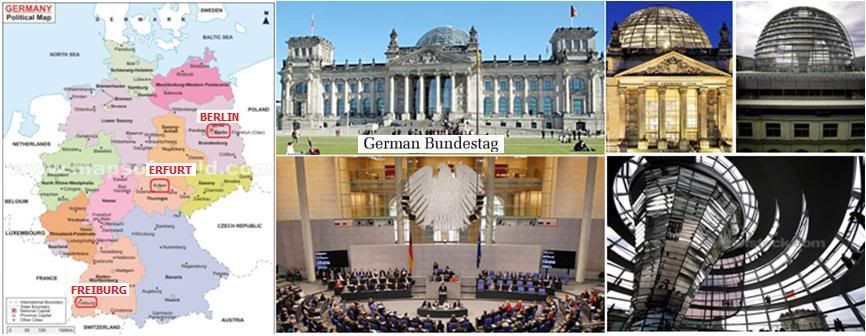 When the burnt-out Reichstag building was rebuilt in teh early 1990s to house the Federal Repbulic's Bundestag, the historic facade was reconstructed but a modern central dome was added.
When the burnt-out Reichstag building was rebuilt in teh early 1990s to house the Federal Repbulic's Bundestag, the historic facade was reconstructed but a modern central dome was added.
BERLIN, Dec. 16 (AP) - Germany's Parliament (Bundestag) says Pope Benedict XVI is expected to address the chamber during a visit to his homeland in September.
The Bavarian-born Pontiff will visit Berlin, Freiburg and Erfurt during a visit from Sept. 22-25.
Speaker Norbert Lammert said Thursday he was pleased the Pope had accepted his invitation to visit the parliament, which is housed in Berlin's historic Reichstag building.
Foreign heads of state who have addressed German lawmakers include then-Russian President Vladimir Putin in 2001, U.S. President George W. Bush in 2002, and Israeli President Shimon Peres earlier this year.
[Earlier, it was reported that some highly secular minority political parties opposed having the Pope address the Bundestag since they claim he is mainly a spiritual and not a political leader. It is fitting that as the first German Pope since Germany came into being as a nation state, Benedict XVI would be the first Pope ever to address the German Parliament.]
[Modificato da TERESA BENEDETTA 16/12/2010 19:36] |
| |
 16/12/2010 20:03 16/12/2010 20:03 |
|
| | | OFFLINE | | Post: 21.703
Post: 4.337 | Registrato il: 28/08/2005
Registrato il: 20/01/2009 | Administratore | Utente Master | |
|
 Pope Benedict welcomes five
Pope Benedict welcomes five
new ambassadors to the Holy See

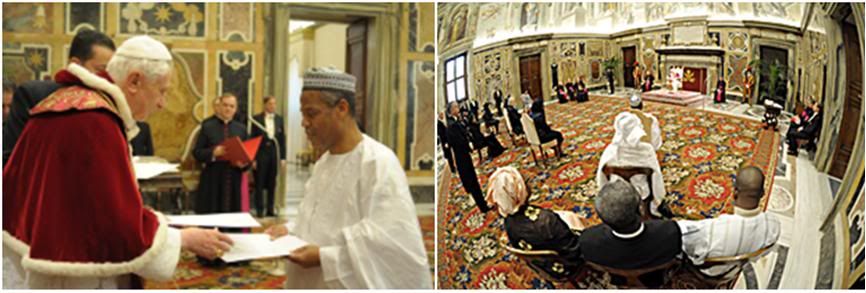
VATICAN CITY, Dec. 16 (VIS) - The Holy Father today received the Letters of Credence of five new ambassadors to the Holy See: Suresh Prasad Pradhan of Nepal; Royson Mabuku Mukwena of Zambia; Miquel Angel Canturri Montanya of Andorra, Vivianne Fock Tave of Seychelles, and Boubacar Sidiki Toure of Mali.
The Holy Father first addressed the diplomats as a group, in French, then gave each of them a speech in written form concerning issues specific to his or her own country.
The Pope focused his collective remarks on the subject of human fraternity, in which context he recalled appeals made over the course of the year "for Haiti, devastated first by the earthquake and them by the cholera epidemic"....
Here is a full translation of the Holy Father's address to the diplomats:
Your Excellencies,
It is a joy for me to receive you this morning at the Apostolic Palace for the presentation of the letters accrediting you as Ambassadors Extraordinary and Plenipotentiary of your respective countries to the Holy See: Nepal, Zambia, the Principality of Andorra, the Republic of Seychelles, and Mali.
You have conveyed to me kind words from your respective Chiefs of State, and I thank you for these. I wish you to convey to them in return my deferential greetings and my respectful wishes for them and the high mission that they render in the service of their nations and peoples.
Through you, I also wish to greet all the civilian and religious authorities of your nations, as well as all your compatriots. My prayers and thoughts naturally go to the Catholic communities in your countries. In living according to the Gospel, they bear witness to the spirit of fraternal collaboration.
I wish, Excellencies, to speak to you about human fraternity, to which we have been called poignantly this whole year, in order to bring relief to Haiti, struck first by an earthquake and now by cholera. Other tragedies have unfortunately struck other countries during the year.
Your countries, the international community and worldwide associations have responded to the most urgent appeals for aid, which must naturally be pursued and intensified. For her part, and through her different institutions, the Church brings her contribution in many forms which she will continue to give.
The beautiful ideal of brotherhood, which is mentioned in the national mottos of many countries, has found less resonance in the development of philosophical and political thought than other ideas like freedom, equality, progress or unity.
It has been a principle that has largely remained a dead letter in modern and contemporary political societies, especially because of the influence exercised by individualist and collectivist ideologies
(cf. Compendium of the Social Doctrine of the Church, No. 390).
Brotherhood, as you know, has a special significance for Christians because of God's plan of fraternal love, a fraternity revealed by Christ. In my latest encyclical Caritas in veritate, I dwelt on this theme which is indispensable for harmonious human coexistence.
In order to live with dignity, every human being needs respect. He also needs justice rendered to him, and for his rights to be concretely recognized. Nonetheless, these do not suffice to lead a life that is fully human. Each person also needs fraternity.
This is true not only in close personal relations but also on a planetary scale. Now, even as the globalization process that is under way brings human beings closer to each other, that does not make them brothers. This is a major problem because, as my predecessor Pope Paul VI said, "Under-development has a profound cause in the lack of brotherhood" (cf. Populorum progressio, No. 66).
Human reason recognizes the equality of all men and the need to limit the excessive disparities among them, but it has proven incapable of instituting brotherhood, which is a supernatural gift.
For her part, the Church sees the realization of human brotherhood on earth as a vocation found in God's creative design, and of which she wishes ever more faithfully to work for, on both the universal and local levels as it does in the nations that you represent in the Holy See.
Just as in carrying out the specifically spiritual mission that Christ entrusted to her, the Church inspires in her disciples a particular proximity among them, she desires no less to bring her sincere and strong contribution to the formation of a more fraternal community among all human beings.
That is why she does not behave like a lobby, working only in her own interests, but she works, under the eyes of him who is the creator of all men, to honor the dignity of every person. Thus she tries to establish love and peace as the basis for those multiple human bonds which link persons to each other as God wills in his creative wisdom.
In daily life, fraternity finds concrete expression in generosity and respect that must be manifested in all the areas of human activity, including economic activity. Man's profound identity, his being-in-relation, is also expressed in his economic activity which is one of the grounds for major cooperation among men.
Through my latest encyclical, I wished to emphasize the fact that economy is an area where giving is also possible and even necessary
(cf. Caritas in veritate, Nos. 34-39).
Every form of giving is, in effect, a sign of the presence of God because it leads to the fundamental discovery that in the beginning, everything was given to us. Such an awareness does not make man's conquests less beautiful but it liberates him from the first of all servitudes, that of wanting to create himself.
On the contrary, in recognizing that which was given to him, man can open himself to the action of grace and understand that he is called on to develop himself, not against or simply alongside others, but with and in communion with them.
Nonetheless, if brotherhood among men can find a positive echo on the level of 'social effectiveness', it must not be forgotten that it is not a means but an end in itself (cf. Caritas in veritate, No. 20).
The Church believes in Christ who revealed to us that God is love (cf. Jn 4, 8). She is also convinced that to all who believe in divine charity, God brings the certainty that 'the way of love is open to all men and that the effort to establish unversal brotherhood is not in vain" (Gaudium et Spes, 38).
I have no doubt that you as diplomats would be particularly interested in the different aspects of the politico-social life that I have just reflected upon.
During your mission to the Holy See, you will have the chance, Excellencies, to discover more directly the activities and concerns of the Church on all the continents. And you will always find courteous attention from my co-workers.
Upon yourselves and your families, on the members of your diplomatic missions, and on all the nations that you represent, I invoke the abundance of divine blessings.
[Modificato da TERESA BENEDETTA 17/12/2010 10:10] |
| |
 16/12/2010 20:43 16/12/2010 20:43 |
|
| | | OFFLINE | | Post: 21.704
Post: 4.339 | Registrato il: 28/08/2005
Registrato il: 20/01/2009 | Administratore | Utente Master | |
|


 Pope Benedict reflects
Pope Benedict reflects
on Catholic-Lutheran dialogue

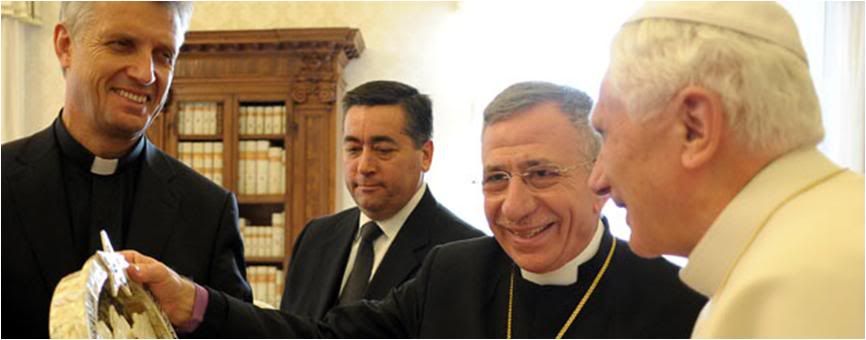
VATICAN CITY, Dec. 16 (VIS) - The Holy Father today received Bishop Munib A. Younan and Rev. Martin Junge, recently elected as president and secretary general of the Lutheran World Federation, who are leading a delegation on an official visit to Rome.
Beginning his English-language address to the group, the Pope highlighted "the many significant fruits produced by these decades of bilateral discussions" between Catholics and Lutherans.
Here is the full text of the Holy Father's address:
Dear Bishop Younan, dear Lutheran Friends,
I am happy to greet the representatives of the Lutheran World Federation on the occasion of your official visit to Rome. I offer my cordial best wishes to Bishop Munib Younan and the Reverend Martin Junge on their respective elections as President and General Secretary, together with my prayers for their term of service.
Five years ago, at the beginning of my pontificate, I had the joy of receiving your predecessors and expressing my hope that the close contacts and intensive dialogue which have characterized ecumenical relations between Catholics and Lutherans would continue to bear rich fruit.
With gratitude we can take stock of the many significant fruits produced by these decades of bilateral discussions. With God's help it has been possible slowly and patiently to remove barriers and to foster visible bonds of unity by means of theological dialogue and practical cooperation, especially at the level of local communities.
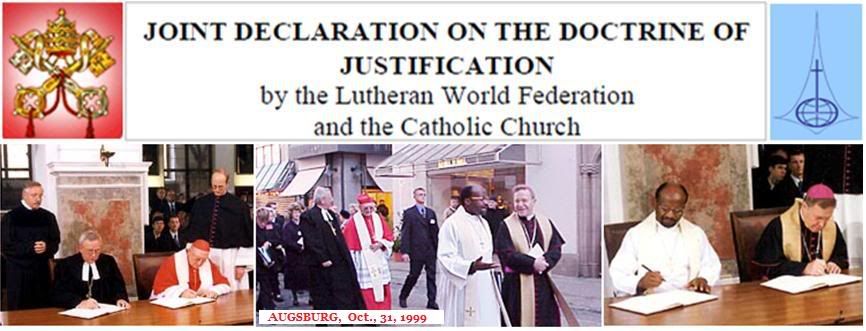
Last year marked the tenth anniversary of the signing of the Joint Declaration on the Doctrine of Justification, which has proved a significant step along the difficult path towards re-establishing full unity among Christians and a stimulus to further ecumenical discussion.
In these years leading up to the 500th anniversary of the events of 1517 [when Martin Luther left the Church to lead the Perotestant Reformation], Catholics and Lutherans are called to reflect anew on where our journey towards unity has led us and to implore the Lord's guidance and help for the future.
I am pleased to note that, for the occasion, the International Lutheran - Roman Catholic Commission on Unity is preparing a joint text which will document what Lutherans and Catholics are able to say together at this point regarding our closer relations after almost five centuries of separation.
In order to clarify further the understanding of the Church, which is the main focus of ecumenical dialogue today, the Commission is studying the theme: Baptism and Growing Church Communion.
It is my hope that these ecumenical activities will provide fresh opportunities for Catholics and Lutherans to grow closer in their lives, their witness to the Gospel, and their efforts to bring the light of Christ to all dimensions of society.
In these days of joyful preparation for the celebration of Christmas, let us entrust one another, and our common quest for Christian unity to the Lord, who is himself the genuine newness which surpasses all our human expectations (cf. Irenaeus, Adv. Haer., IV, 34, 1).
May the peace and joy of this Christmas season be with you all!
The LWF account of the meeting includes Rev. Younan's address to the Pope, with a rather odd headline. How exactly can the Pope and the Catholic church 'celebrate' the Reformation, even if it is a demi-millennial anniversary????
LWF invites Pope to join
planning for 500th anniversary
of the Protestant Reformation


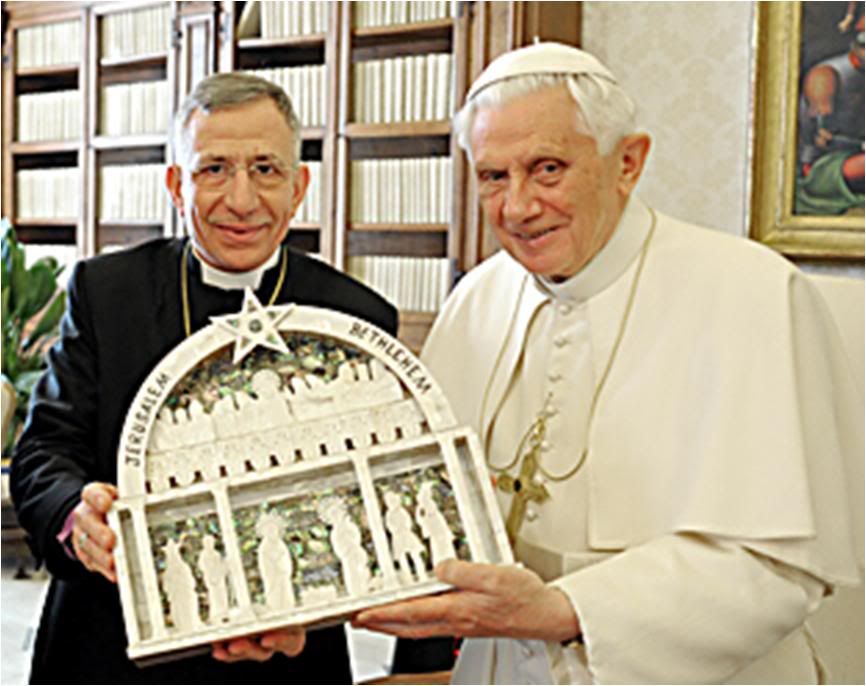 A gift to the Holy Father is a mother-of-pearl carving depicting the Last Supper, from Bethlehem.
A gift to the Holy Father is a mother-of-pearl carving depicting the Last Supper, from Bethlehem.
Vatican/GENEVA, 16 December 2010 (LWF) – The Lutheran World Federation (LWF) President Bishop Dr Munib A. Younan has invited Pope Benedict XVI to work together with the Lutheran communion in realizing an ecumenically accountable commemoration of the 500th anniversary of the beginning of the Protestant Reformation.
“For us there is joy in the liberating power of the gospel proclaimed afresh by the reformers, and we will celebrate that,” said Younan in a message today, when he led a seven-member delegation in a private audience with the Pope. He underlined the need to recognize both the damaging aspects of the Reformation and ecumenical progress.
“But we cannot achieve this ecumenical accountability on our own, without your help. Thus we invite you to work together with us in preparing this anniversary, so that in 2017 we are closer to sharing in the Bread of Life than we are today.”
Greeting the LWF delegation, Pope Benedict expressed gratitude for “the many significant fruits produced” by decades of bilateral discussions between Lutherans and Roman Catholics, saying it had been possible “slowly and patiently to remove barriers and to foster visible bonds of unity by means of theological dialogue and practical cooperation, especially at the level of local communities.”
In the years leading up to the next Reformation anniversary, “Catholics and Lutherans are called to reflect anew on where our journey towards unity has led us and to implore the Lord’s guidance and help for the future,” he said.
The Pope pointed out that the signing of the Joint Declaration on the Doctrine of Justification (JDDJ), whose tenth anniversary was marked in 2009, “has proved a significant step along the difficult path towards re-establishing full unity among Christians and a stimulus to further ecumenical discussion.”
He reiterated his expectation that the close contacts and intensive dialogue which have characterized ecumenical relations between Catholics and Lutherans would continue to bear rich fruit.
Representing every LWF region, the delegation included also the General Secretary Rev. Martin Junge and regional vice presidents from Africa, Presiding Bishop Alex G. Malasusa (Tanzania); from Central Eastern Europe, Bishop Tamás Fabiny (Hungary); and from the Nordic region, Presiding Bishop Helga Haugland Byfuglien (Norway); and staff. Also present was Kurt Cardinal Koch, president of the Pontifical Council for Promoting Christian Unity (PCPCU), and other Vatican staff.
In his statement, Younan reiterated the LWF’s commitment to “moving closer toward one another around this Table of the Lord, which Luther saw as the summa evangelii.”
The LWF president pointed out that while it was important to “rejoice in each small step which brings us closer together, we do not want to be content with these steps. We remain strong in hope – both for the full visible unity of Christ’s Church and for the Eucharistic communion which is so crucial a manifestation of that unity.”
Younan presented to the Pope a gift from Bethlehem, a carving depicting the Last Supper. Referring to this image, he said, “Each of us can bear witness to the importance of this sacramental meal in nurturing our own Christian lives. Each of us also knows the yearning for the time when we will be able to celebrate this feast together,” said the LWF president.
Younan noted that the LWF had taken a significant step toward Christian reconciliation at its July 2010 Eleventh Assembly in Stuttgart, Germany, by asking forgiveness from Mennonites for the persecution of Anabaptists in the 16th century.
In preparing for this act, he said, the LWF was mindful that this legacy was shared by other traditions, including Roman Catholics, who with other ecumenical guests stood in solemn solidarity when the action was pronounced at the Assembly.
“We believe that we took this action on behalf of the whole body of Christ. We pray that this spirit of repentance, reconciliation and renewal will continue to grow among us.”
Younan, who is head of the Evangelical Lutheran Church in Jordan and the Holy Land, noted that Catholics and Lutherans share a vision for just peace in the Middle East and support a two-state solution with a shared Jerusalem.
He thanked the Pope for his moral leadership in exposing the injustices and idolatries of the global financial crisis – also a concern shared by the LWF, notably in its advocacy against illegitimate debt. On both issues, he urged closer collaboration.
“Our witness will be stronger if we will work together on these problems. Thus we look forward to forging multiple cooperations with our Catholic sisters and brothers at all levels, locally as well as globally,” Younan said.
The LWF president noted that he and the General Secretary represent the new leadership of the global Lutheran communion. Younan was elected President at Stuttgart in July, while Junge began his term of office in November.
The audience with the Pope honors the extraordinary journey by the two churches in recent years, and is a sign of hope for their future relations, Younan said.
Lutherans continue to rejoice, he added, because of the ways the two churches have reached new degrees of theological understanding and agreement, noting in particular the landmark Joint Declaration on the Doctrine of Justification.
“Within our own lifetimes, the climate of relations between Lutherans and Catholics has warmed dramatically – and this climate change has been for the good! Around the world our churches live in a new ecology of relationship.” Younan concluded.
[Modificato da TERESA BENEDETTA 16/12/2010 21:10] |
| |
|
|
|
|